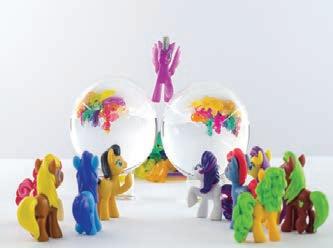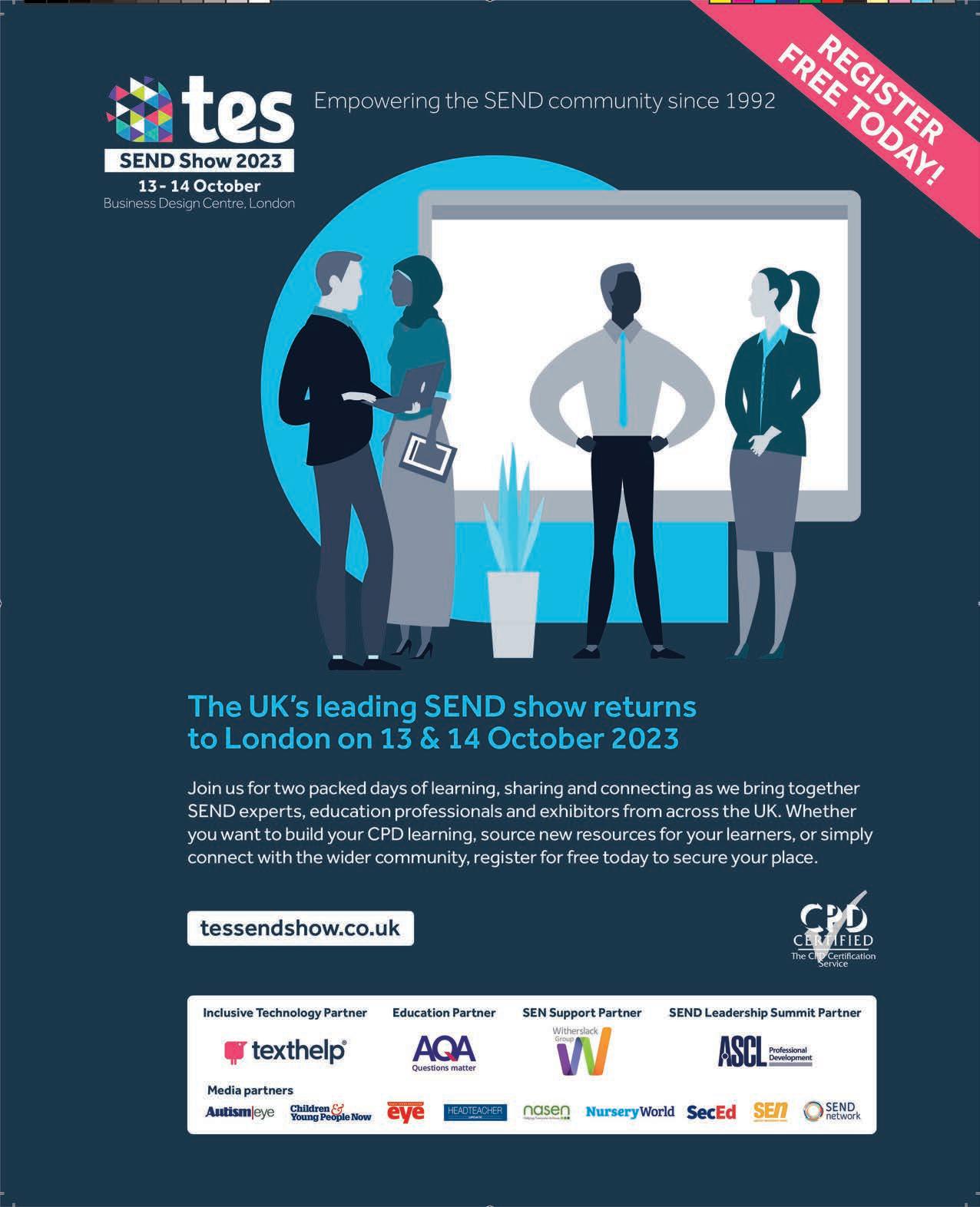Demand avoidance

















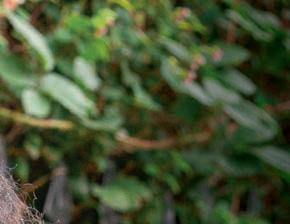
Strategies and tips


Stuck in hospital
Sylvia and Jamie’s story School

Demand avoidance


















Strategies and tips


Stuck in hospital
Sylvia and Jamie’s story School

Eden-Rose’s report






Autumn 2023
Plus






Routines, work profiles, and learning to type

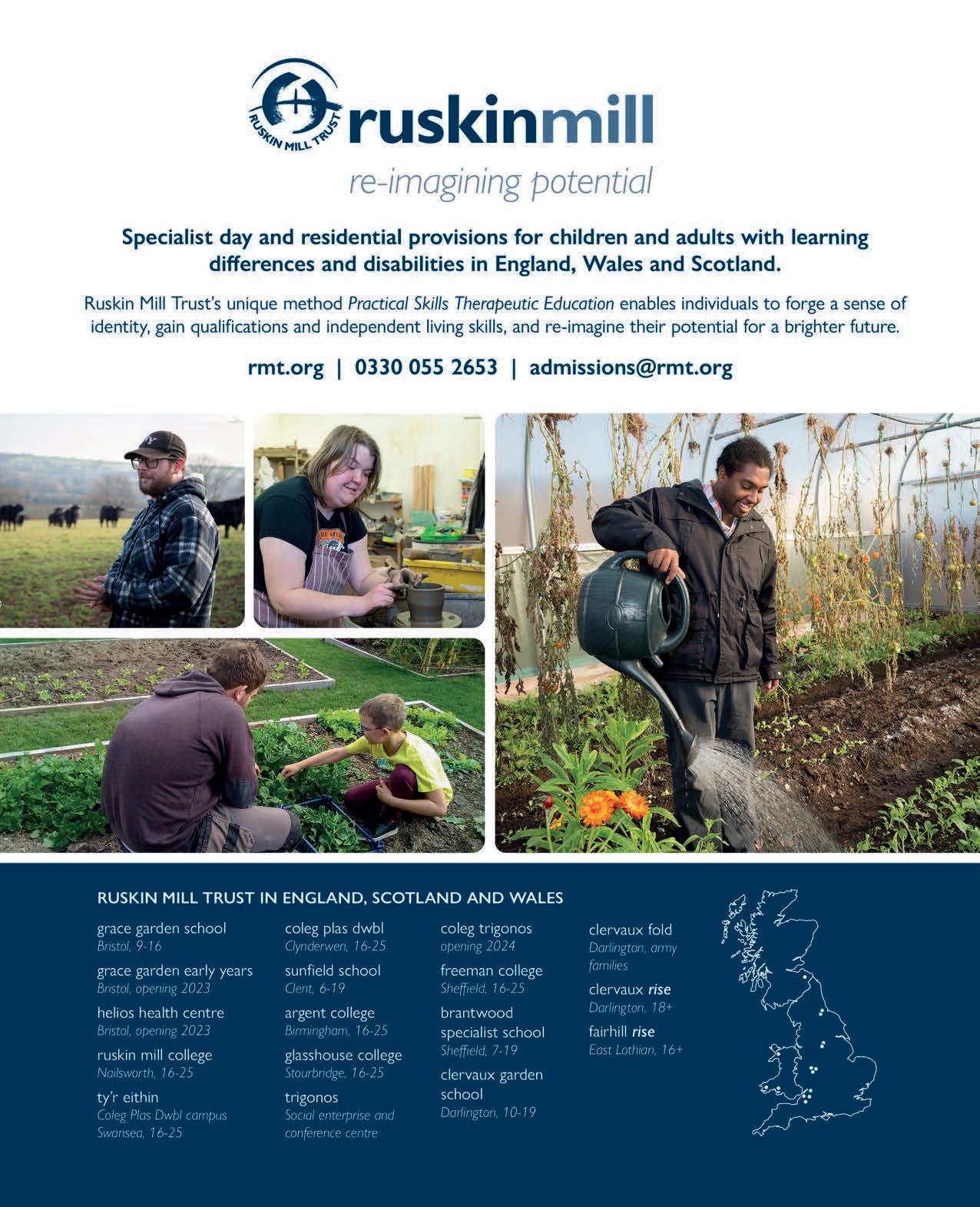
EDITOR
Suzanne Westbury
YourAutismMag@nas.org.uk
CONTRIBUTORS
Sophie Brown and Charlotte Gush

HEAD OFFICE
National Autistic Society
393 City Road London EC1V 1NG
Tel: 020 7833 2299
autism.org.uk
SUPPORTER CARE TEAM
0808 800 1050 membership@nas.org.uk


ADVERTISING
James Pembroke Media
Tel: 0203 859 7098 hoby.abdel@jamespembroke media.co.uk
SUBSCRIPTIONS
Only available to members of the National Autistic Society. To join, visit autism.org.uk

DESIGN AND PRODUCTION
CPL One 01223 378000 cplone.co.uk
1 Cambridge Technopark, Newmarket Road, Cambridge CB5 8PB
What’s
Warners Midlands 01778 391000
National Autistic Society is a charity registered in England and Wales (269425) and in Scotland (SC039427) and a company limited by guarantee, registered in England (No.1205298), registered office 393 City Road, London EC1V 1NG
© Your Autism magazine
Autumn Vol 57, No 3
National Autistic Society ISSN 2055-0413
The views expressed in Your Autism and any enclosures or advertisements are not necessarily those of the National Autistic Society. In the interest of providing readers with the widest range of information, we may include details of some of the many approaches to autism. However, this does not imply our charity’s endorsement of any particular approach or product. The inclusion of a website does not necessarily imply that our charity endorses or supports the group or individuals running the website, nor does the absence of a website imply that our charity does not endorse or support the group or individual running the website.
My diagnosis
Clair and sons Dawson and Ellis
Real stories
Eden-Rose talks about coping in the classroom

Being out of school
Freya on why the education system doesn’t work for her
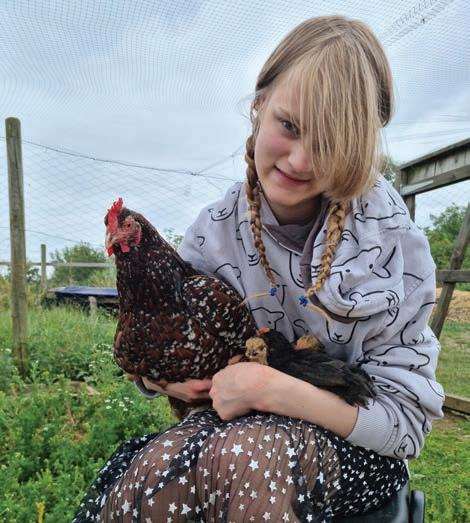
Working life
Safari truck driver Ed

Trapped in hospital
Sylvia tells her son’s story
“It’s not a comfort, it’s a cage”
When routines become restrictive

Readers to the rescue
Helping to teach a child to type
Creating an autism profile for work
How to get started
Self-managing demand avoidance
Riko and Steph share their tips
Notebook
Things to read, do and see
I’m an... artist and author
Juno on their art, writing a book, and their teacher Sarah
“In Scotland, 67% of autistic people feel socially isolated”
Our round-up of the latest news and views
We asked our campaigners to send us pictures of the ideal autism-friendly school for our competition. Now the judges have chosen their winning entries!
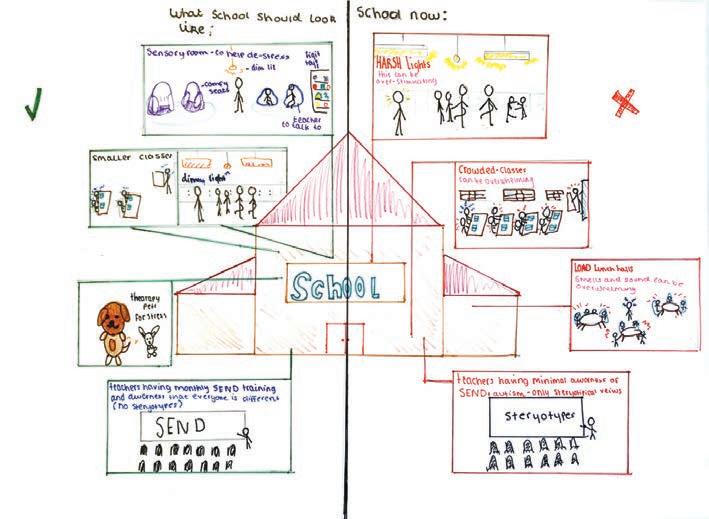
Congratulations to Dilly and Jaja for their creativeentries showing lots of the important steps schools can take to make education more accessible for autistic pupils.
We had so many amazing entries and we’ll be sharing lots of them with MPs in Parliament so they can see for themselves exactly what needs to change to make schools work for autistic people.
See more of the entries at autism.org.uk/ideal-school
Our charity recently received funding from the Department for Transport to help transport providers become more autism friendly.
Eight transport companies took part, including train, bus, ferry, Dial-a-Ride and tram operators.

We created a transport-specific training module to help staff to understand the difficulties faced by autistic people and what they should consider when offering adjustments. The companies then completed our Autism Friendly Award, which provided a framework for them to reflect on their current accessibility for autistic people and implement improvements. We also sought feedback from autistic secret shoppers for each operator.
Since participating, the operators have introduced many positive changes to support autistic customers.
These include: making ear defenders available; updating websites for easier navigation; providing sensory packs; designated quiet areas; offering early boarding and familiarisation visits; and, most importantly, working with autistic people and their families to seek their input into further developments.
Businesses can sign up for our Autism Friendly Award at autism.org.uk/autism-friendly-award
A study from University College London was published this summer, drawing much needed attention to the experiences of older autistic adults, in particular issues around diagnosis.
The first-of-its-kind study suggests between 250,000 and 600,000 autistic people over the age of 50 may be undiagnosed. It also highlights that the true number of autistic people in England may be significantly more than previously understood.
For many autistic people of all ages, diagnosis is a very important and positive step towards understanding and support. Now researchers are calling for better access to diagnostic services for adults, and a greater acceptance and understanding of autism in society.

Dr O’Nions who led the project added: “Our findings indicate that there is still a substantial diagnostic gap in adults compared to children and young people when it comes to autism in England. This may partly reflect a lack of awareness and understanding of autism in adults on the part of healthcare professionals.”
The National Autistic Society was delighted to be a partner on this project, and would welcome more research on this important area. You can read the study in full at bit.ly/autism-diagnosis-older-adults

Congratulations to our Christmas card competition winners! We ran our annual competition to find new, unique designs for our Christmas card range, which we put to a vote on social media. Our adult winner is Laurene, who designed the lovely Cosy Winter Days. The children’s category winner is the dramatic Reindeer by Isaac. Everything you buy from our Christmas range will go towards our work to create a society that works for autistic people.
Cards are on sale now, so get yours at autism.org.uk/christmas-cards
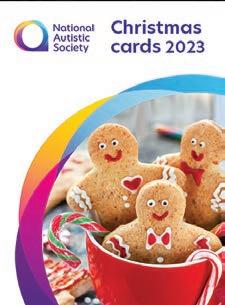


28 October 2023
Abseil for Autism
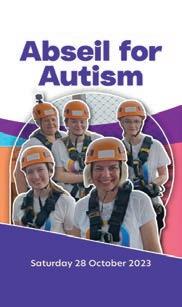
Become a Team Autism
Superhero and face your fears this October. You’ll be raising money to support autistic people and their families while conquering the world’s highest static abseil. Sign up at autism.org.uk/abseil
14 November 2023
Matt and Co Comedy Show
We are thrilled to announce the return of the Matt and Co Comedy Show, hosted by award-winning comedian – and our ambassador – Matt Richardson. Join us at the Clapham Grand in London to see Rhod Gilbert, Rosie Jones, Joe Wells, Milton Jones, Paul Sinha, Cally Beaton, Josh Jones and Jen Brister. Tickets are on sale at autism. org.uk/the-mattand-co-comedyshow-2023
18 November 2023
Annual General Meeting (AGM)
We hope to see you at our AGM for an update on our charity’s work. Register at autism.org.uk/agm
6 December 2023
Starshine Carol Concert
Save the date for an evening of Christmas carols and festive cheer, featuring the EC4 Music choir and celebrity guests!
2-8 April 2024
Add these dates to your 2024 diary, especially if you work in a school with a busy events calendar.
6 Your Autism
We are so grateful to all our fundraisers – we simply couldn’t do our work without you. This quarter, we would like to highlight Zack (pictured above) who wrote to us in early May:
“I’m Zack, and I’m 13. I’m home-schooled and have autism. As part of my schoolwork, I’m learning about business and finance, and I had an idea to make these cute soft chickens and sell them on my Nan’s craft stall to raise money for the National Autistic Society. I have already made 50 and I want to give some of the money from each sale to your organisation.”
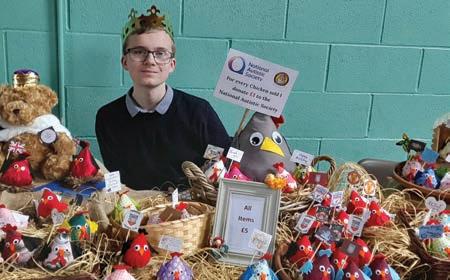
Well done Zack!

Our new Connections programme in Scotland will provide social opportunities for more than 130 autistic adults aged 25-55. Funded by the Social Isolation and Loneliness Fund, it will offer participants regular meet-ups with autistic peers going through similar life stages and challenges. In Scotland, 67% of autistic people feel socially isolated, and are four times more likely to experience chronic loneliness than the general population. Connections will run three groups, which will meet fortnightly. Two will be open to autistic adults in the Glasgow area, with one online group for autistic women across Scotland. Visit autism.org.uk/Scotland or email Scotlandsocialgroups@nas.org.uk.






Our Autism at Work programme aims to increase the number of autistic people in sustainable paid employment by making employers aware of autistic people and the benefits of a truly neurodiverse workforce.
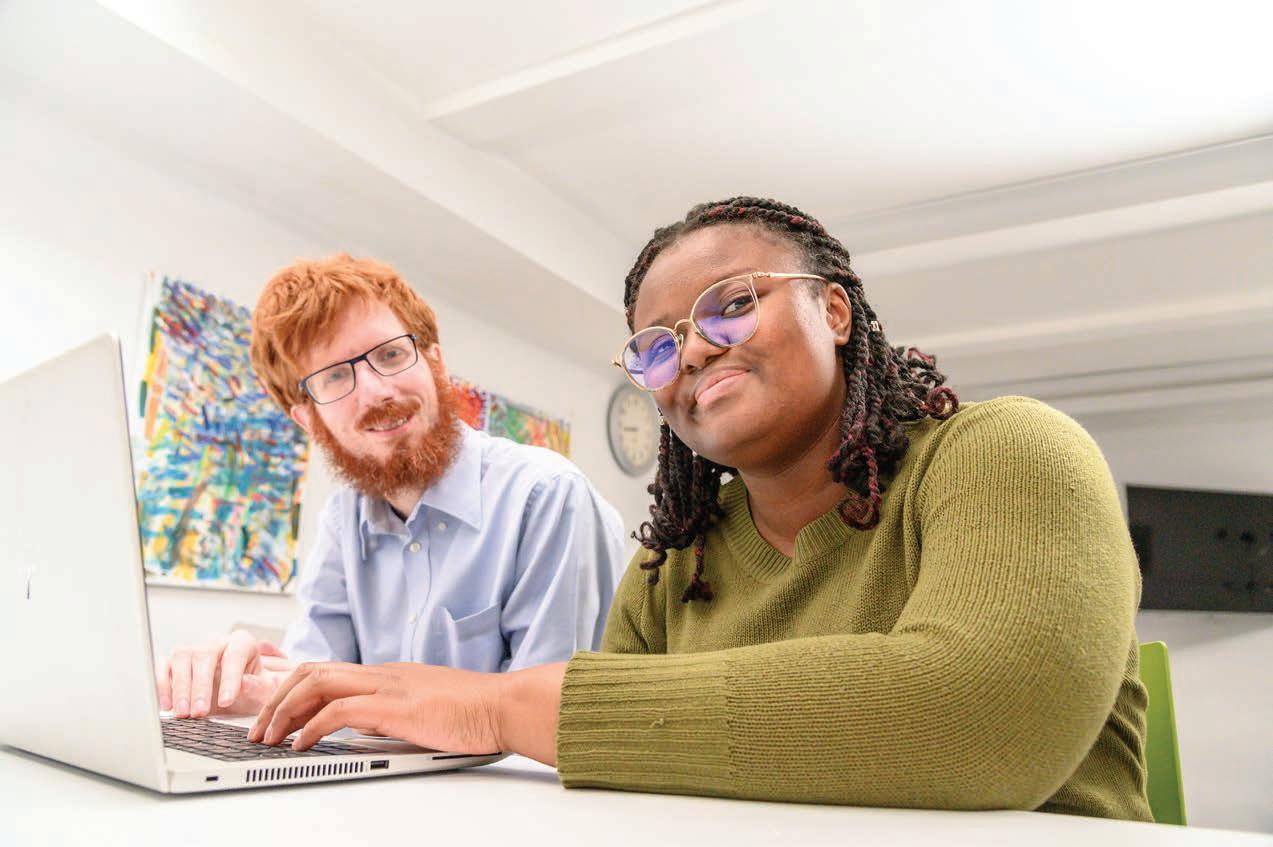
We support employers to attract, recruit and retain autistic employees. We promote accessible roles to autistic jobseekers and offer ongoing




















Find out more about our Autism at Work programme autism.org.uk/work
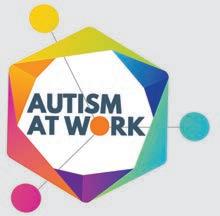
Autism Central is a new programme, commissioned by NHS England. It aims to build knowledge and understanding of autism and empower families to advocate for their autistic family member to get the right understanding and adaptations in place across services they use. It’s launching now but will keep developing in the future with more content being added.
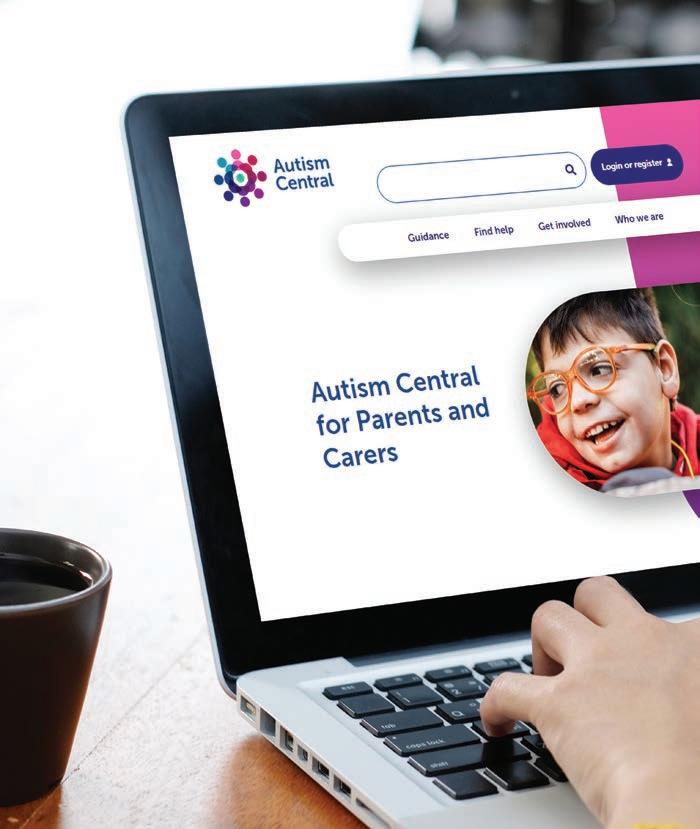
“Autism Central is helping families to learn more about autism and the support available to them by curating and signposting to useful resources and learning on a wide range of topics, educating them on how to advocate for their autistic family member in the services they encounter.” – Lisa Myers, Programme Director, Autism Central.
Everything the programme does is informed by or co-produced with autistic people, parents and carers.
“I want to make a positive difference to autistic people and their families by sharing my experience and helping parents and carers understand more about autism.” – Salaha Khaleque, parent carer panel member.
Autism Central works in partnership, bringing together nine partners who developed the programme. Autism Central hubs deliver the programme in seven regions
of England through group and one-to-one sessions, giving information on local services. Each session is delivered by parents and carers of autistic people who are happy to share their knowledge and experience with others.
“Working in partnership is vital for Autism Central, so we can draw on a wide range of experience, and keep developing a service that makes a difference for parents and carers.” – Adam Micklethwaite, Chair of Autism Central governance steering group, Autism Alliance.
Sometimes, talking to people who share similar experiences means you are more likely to feel understood and get the help you need. That’s why Autism Central works with parents and autistic people to become peer educators who facilitate education and share knowledge with
The Autism Central vision is a world where parents and carers of autistic children and adults are knowledgeable about autism, confident in navigating services and empowered to maintain both their own wellbeing and the wellbeing of the autistic person they support.
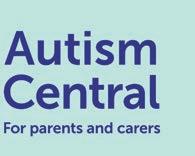
Commissioned by:
In partnership with:
other families. They are here to listen, offer guidance, and tell you about services that are available in a local area.
“Following my children’s diagnosis, I found little support or understanding. Now I have experience and knowledge from my own family, I want to support and encourage other parents and carers, empowering them in their journey.” – Ange Neale, peer educator, East of England.

The programme is free to access. Information, guidance and events are all available on the Autism Central website, which includes:



● Explore topics such as diagnosis, employment and mental health, and find key information from partners and other trusted sources.
● Find help: search for a regional hub to find group and one-to-one sessions with


information and services available in your area.

● Events: talk to people who share similar experiences by joining a workshop, drop-in session, coffee morning or virtual meet-up.
● Online learning: sign up to access further learning resources and personal stories from other parents and carers. autismcentral.org.uk


Are you a parent or carer of an autistic person? Would you like to help other families of autistic people in your local area? Autism Central is looking for people who are interested in becoming peer educators and sharing their knowledge and experience with others.
To find out more, contact your local hub at autismcentral.org.uk/find-help

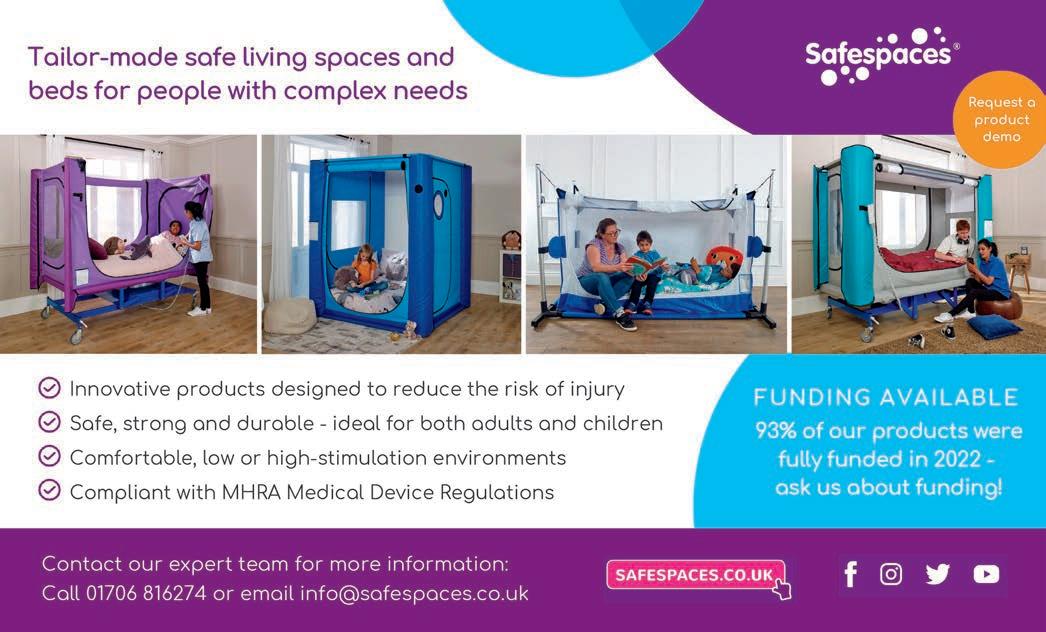
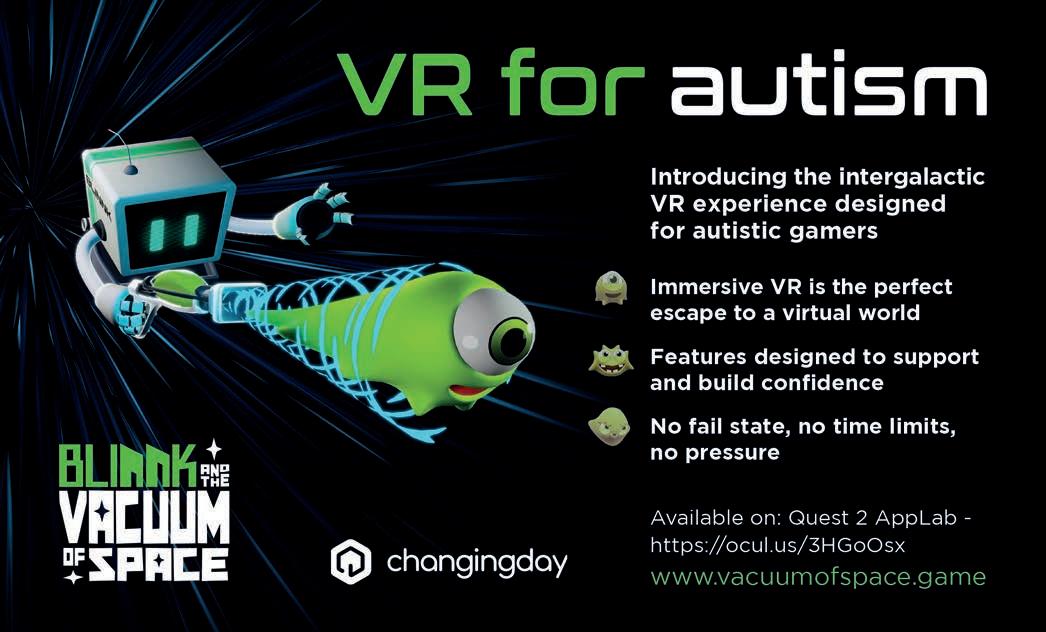
Four years after marrying Steve, we welcomed our son, Dawson, into the world. He was quite advanced, preferring educational toys to imagination toys. He blew our minds when he was able to recite the full alphabet before he was two and less than a year later was reading! I didn’t know much about autism, but I started to research it and felt it might make sense. After a two-year wait, he was diagnosed as autistic.
Ellis was born in 2017. At his newborn hearing screen, we were told there was possibly an issue with his hearing, and he was later diagnosed as being bilaterally deaf. I found his arrival very difficult to adjust to, and reached out to the mental health team as I was super erratic and struggling to sleep. A psychiatrist felt I was suffering from psychosis in pregnancy, and advised me to be admitted to a mental health unit for assessment.
I said to my mum that it was as though I was in a cocoon, and I was going to come out as a butterfly and finally know who I was. I was admitted informally for two weeks and discharged with a diagnosis of bipolar and obsessivecompulsive disorder (OCD). I didn’t agree with the bipolar label, having worked in mental health for 15 years, so I challenged it, but struggled to get the psychiatrists to take me seriously.
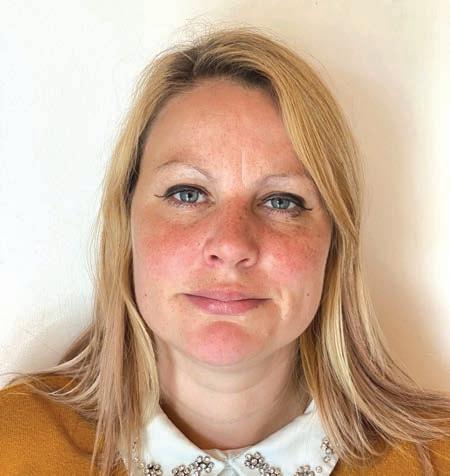
Ellis didn’t start walking until he was 21 months and we were advised that he was probably autistic, like his big brother. At this point, I raised the possibility that I, too, could be autistic. I had been watching Dawson and could so relate to him and understand his thought processes. I did an AQ10 test, scored 6/10 and was told I was ‘borderline autistic’. I went to my GP and was referred for my own autism assessment.
Ellis was diagnosed as autistic after a two-year wait and later diagnosed with attention deficit hyperactivity disorder (ADHD). Dawson was diagnosed as having type 1 diabetes in June 2022.
All these diagnoses have been a complete bombshell to us, resulting in a steep learning curve and mix of emotions.
In 2022, I was diagnosed as autistic and, this year, as having ADHD, too. Ellis and I are on the same ADHD medication. The doctor agreed that I do not have bipolar, which was a huge weight lifted off me.
Life has been a rollercoaster ride of research, waiting and chasing various diagnoses. I am now writing a book about my life, Don’t stop believing. Sometimes, you just need to believe in yourself and challenge what you think is wrong.
This butterfly has finally been released and is ready to spread her wings and fly... watch out world, here I come!
Clair’s sons were diagnosed as autistic – and then she was, tooHaving autism makes me feel special. I know that I am unique because I think and do things differently. There are so many beautiful things that I notice that others may not. I see the world in such detail which fuels my imagination, but this can also be chaotic and overwhelming sometimes. For example, I notice the smallest crumb of food on the floor
which can completely dysregulate me. Because of my limited motor skills, I still struggle to do things such as turning a key and tying shoelaces. My sensory needs impact me in so many ways but I continue to develop my skills through occupational therapy.
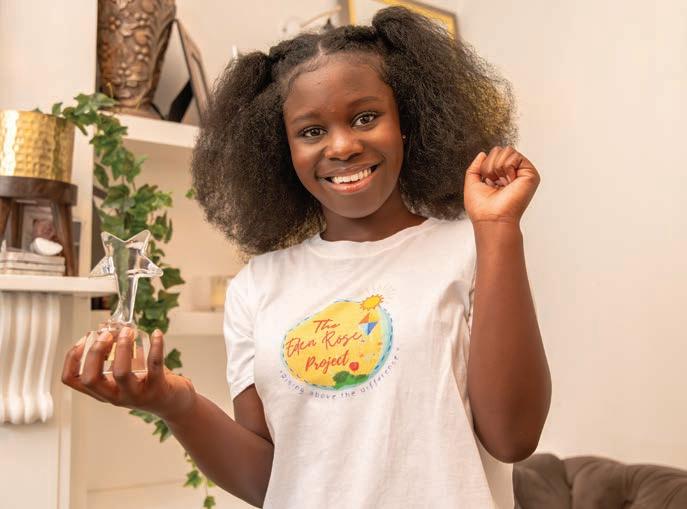
Despite these challenges, I don’t let them get me down. I am very
sensitive to tone and respond well to a calm and nurturing environment. I empathise a lot with people, even if it is sometimes a challenge to understand them well. On days when I get frustrated about my challenges, I remind myself what I’m great at thanks to autism! I find it really easy to learn new languages and have taught myself to play piano. I’m now composing my own music, which one day I hope to share with the world.
I’m lucky enough to have a resource base at my school. It feels like a really safe space and we have created a nice welcoming community. For instance, we have our own garden and I help to water the plants. I go there a lot because I find morning registrations difficult. I find it too loud and intimidating so I prefer to be registered in the base. I struggle with lunchtime in the canteen. Again, once I get my food, I go to the resource base for lunch. The noise, crumbs on the floor and the smell of the canteen is too much for me, even though the lunch ladies are always very nice. Sometimes I struggle with the food options – I can be a little fussy and now I’m
● When you feel upset, take time to notice all the lovely things around you as well as the skills you have.
● Use Zones of Regulation (zonesofregulation.com) to know where you are on the chart.
● Adapting to changes can be difficult so I sometimes talk to an adult about my concerns. But if not, you can use deep breathing to help calm you down and you will be able to work to adapt to those changes by trying to be positive.
● Be proud of what you create. Whatever you create is special in its own way. So when you look at a drawing you created and then don’t like it because it doesn’t look how you wanted it to, try not to be your own worst critic.
● Use sensory products to calm you down, such as sensory foam and theraputty.

pescetarian, my options are even more limited.
I struggle to adapt to changes every day. It’s usually when the change is unexpected – for example, when my regular teacher is absent and a replacement covers for them, or when another student sits in my regular seat. Recently I found out that our SENDCO was leaving which made me sad, but because she took time out to talk to me about it, I felt better and a little more prepared for the change when it happens.
Friendships have been difficult for
me. I have very few shared interests with girls my age and sometimes feel misunderstood. I laugh at things others don’t find funny and sometimes what makes others laugh doesn’t amuse me. Also, being in groups can be tough and can make me feel very anxious.
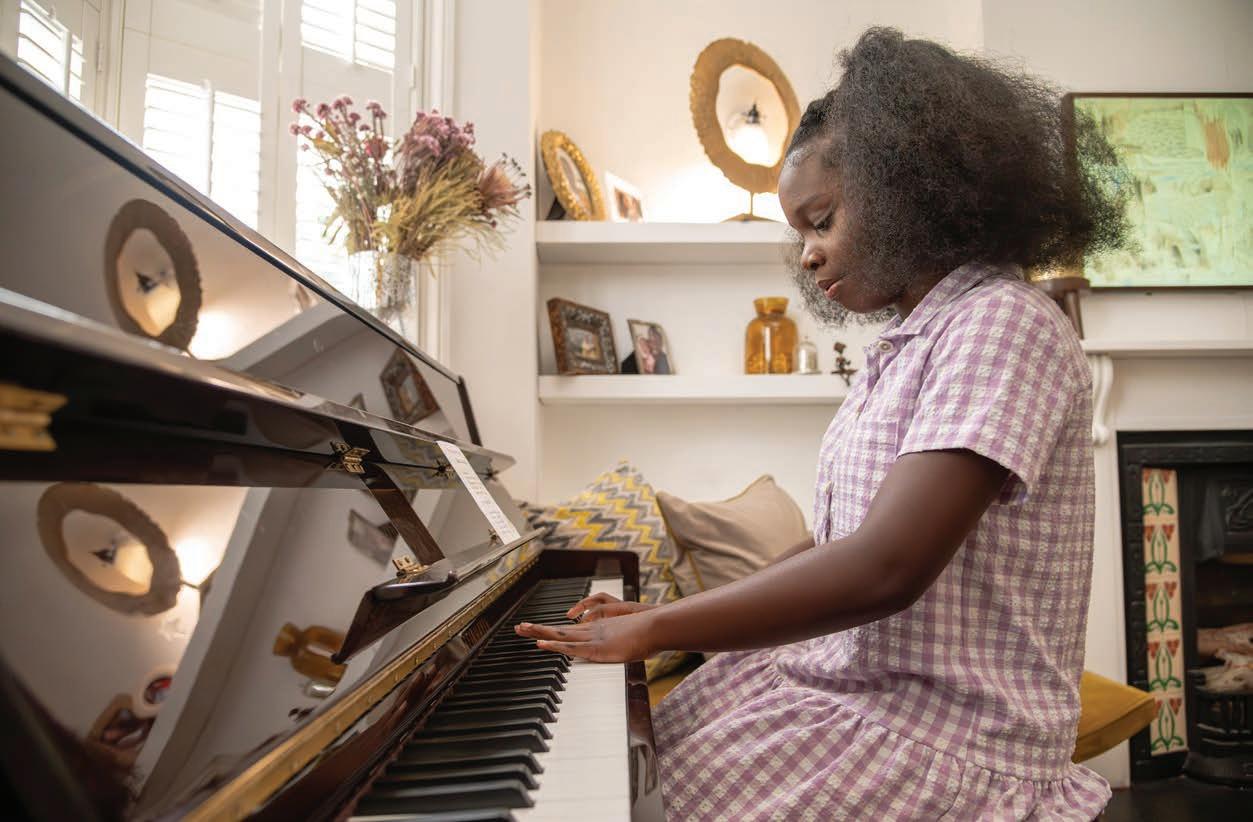
The transition from primary school, where I had a place in their special provision, to a mainstream secondary school was one of the most difficult times of my life. I was really scared and anxious and struggled to adapt. I felt I didn’t know a lot of things. Everything was different, teachers, the other students and especially the building and I didn’t get as much help getting around as I did at my
previous school. I did get lost a few times which was frightening. I really didn’t like the different smells and noises. This school was a lot bigger and noisier, and having to move from class to class was overwhelming. Lesson changes were noisy, too, so I would wear my ear defenders. My dad got me black ones so I didn’t stand out too much. I used to wear them throughout the day, but I use them less now as they make me stand out more than I already do. There is also a lot more expectation. Maybe it is because I’m older now and so I have to be more responsible and independent. I didn’t have to do homework in my special provision and now I have to do a lot. In my special provision, I would do my work in a different way from everyone
“I respond well to a calm and nurturing environment”
else, but now I have to do the same work. But, as I’m getting older, I’m coping better.
A nice thing is the relationships I have built with school staff. Most teachers know my name – I think it’s because I’m always happy and smiling. They also comment on how polite I am. I love maths, science and Spanish and am proud of how well I’m doing in these subjects. I have taken on more responsibilities and am deputy form captain. I was awarded the Emily Hodder award for raising autism awareness and I have also presented to my year group about autism.
I enjoy going to school most days because I feel part of the school community, but other days it can get overwhelming. Now I’m able to walk independently to and from school, which is 15-20 minutes each way.
Sometimes I take the bus, but I prefer to walk as I love being outside.
My advocacy work started when talking to my parents about how they felt when they were told I had autism. They had heard of autism, but didn’t know much about it and how it would impact me. I thought about others going through that, and that it would be helpful if I could explain to them not just the challenges, but also some of my achievements so they feel encouraged about the journey. So I started the Eden Rose Project to share my challenges, obsessions and achievements with parents, carers and key workers. Although I usually get anxious in new surroundings, I love presenting to an audience. I also play the piano at the end and it is always nice to see the emotional
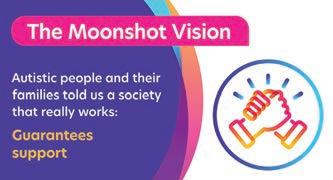
reactions to my compositions. I have a website: edenroseproject.com and an Instagram page – theedenrose project – where you can view my journey and listen to my compositions.
For practical advice on starting secondary school, visit autism.org.uk/ transitions

Content warning: this article talks about experiences of loneliness and isolation





You may think school is so hard that your life would be better without school altogether. I’m here to tell you why you are wrong and, if you’re in school, are lucky to be receiving a good education that works for you. I’m 15 years old and in year 9 for the second time.
You might think how great it would be if you could spend every day at home doing whatever you want. At the moment, I have that life. I have a rough routine, but for the most part I can watch what I want, read what I want, do what I want. However, that comes with a heavy price. First, I have no friends, and haven’t had for four years. You can’t pretend to know how suffocating loneliness is until you have experienced it. I spend day after day sad, with no energy to do anything because I haven’t seen anyone, apart from family, for months. Second, you may think that watching TV all day is great, but you do run out of things to watch. After three years, it is not fun any more. It is a suffocating and lonely way to exist.
The education system doesn’t work for me because I’m autistic. The very way that lessons are taught and grades decided literally does not work for me and others. I haven’t taken a test in three years, and one of the last ones I cared about and remember was a science test. I think it was an end-ofunit test, just to see how much knowledge we had retained. I’m sure we were told it doesn’t matter, just do your best. I completely broke down in that test. I started crying and was so stressed about it. Looking back, I could have had a panic attack. It turned out that I was joint top of the class in that test. But that fact does not make me feel any better about the next test I will inevitably have to take. Exams do not work for me. It is so hard to sit still in a room with 100 other people not
talking or making much noise. You are sitting there, getting so worked up and stressed about every answer. If you tried to take deep breaths to calm yourself, all you would hear was the scratching of pencils, the occasional cough or chair moving. That is not calming; it is the opposite, especially when you have social anxiety and feel like every eye in the hall is on you, watching you, lasering the back of your neck. You can’t look around to prove your brain wrong, because what would someone think if you suddenly turned around? You can’t fiddle because that draws attention to yourself, so you quickly get consumed with a vicious cycle of negative and suffocating thoughts.
Then you realise ‘I’ve still got an exam to do’. Then you start to catastrophise, which means really negative thoughts start circling (for example, you might be thinking: I am going to fail this test, so I can’t get the job I want or buy a house because you can’t get a job with no GCSEs so my life is over and I haven’t even done anything. This is the worst thing ever) – and you can’t get them to stop, especially because you can’t change the
Freya writes frankly about being out of school –and why the education system just doesn’t work for her
“The very way lessons are taught and grades decided literally does not work for me”
environment or do anything comforting. That is why tests don’t work for me.
I retained no knowledge of year 8 maths. The way it was taught absolutely did not work for me. I took French and Spanish. I was in the top set for both; I did two years of French and six months of Spanish. In French, I don’t even know the numbers one to ten. In Spanish, I know one to 20, but I would say I put in about double the effort. I really tried, I wrote everything down, I made flash cards and literally all I remember is one to 20.
Lockdown learning was hell. I couldn’t be in an online classroom on Teams because my social anxiety was so bad. I couldn’t watch educational videos because I just got distracted. I was so alone. I had no friends to text with, my parents were both working from home. Plus, I wasn’t diagnosed as autistic then, so we had no additional help.
Out of lockdown, the first half-term of year 8, my attendance was reasonably good. After the October holiday, it was increasingly bad towards Christmas. And that was basically all
of year 8 I completed, because my anxiety was so bad and I couldn’t really learn. Year 9, the first term was good. I was getting into school every day, but then that arrangement stopped abruptly. I wasn’t in consistently until the last month of school. Year 10 was looking good. Then the council told us I had to move to a different school. We had no choice; it was just a fact (I needed to repeat year 9 to go to the different school). The new school started off well, but then before the October holiday it stopped going well. I haven’t been in consistently since and, in a few months, I will be 16, in year 10, without being in school consistently for three years. I can’t do anything on my own. I can’t go to the One Stop store down my road on my own. I have no friends, a limited education and I see happy people walk to school every day. If that is a price you are willing to pay, simply to have more time to yourself, I would be astounded. My life has not been easy so far.
Read our guide on what to do if your child is out of school: autism.org. uk/schoolanxiety
Read more school experiences at autism. org.uk/education report2023

Freya’s dad, Jonathan, is running the Royal Parks Half Marathon to raise funds for our charity. You can sponsor him at bit.ly/JonathanCRoyalParks
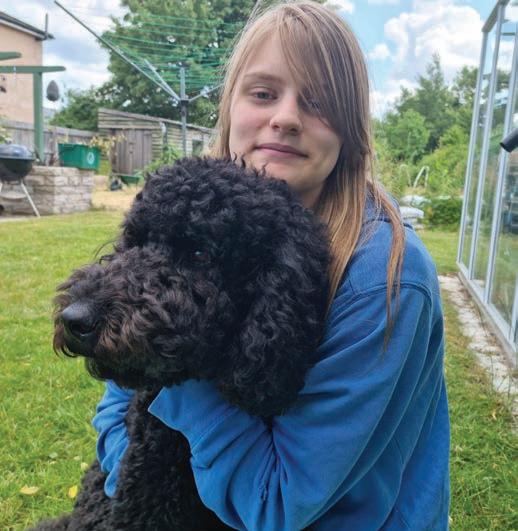
“Lifehas not been easy so far” – Freya
Providing counselling therapy for lives that have become adversely affected by the experience of autism and Asperger’s syndrome
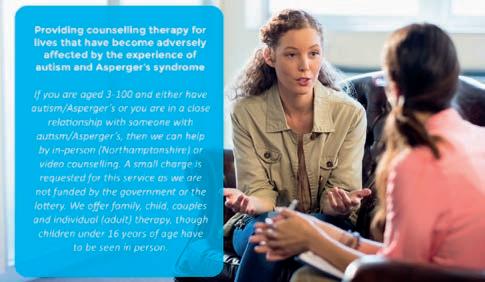
If you are aged 3-100 and either have autism/Asperger’s or you are in a close relationship with someone with autism/Asperger’s, then we can help by in-person (Northamptonshire) or video counselling. A small charge is requested for this service as we are not funded by the government or the lottery. We offer family, child, couples and individual (adult) therapy, though children under 16 years of age have to be seen in person.
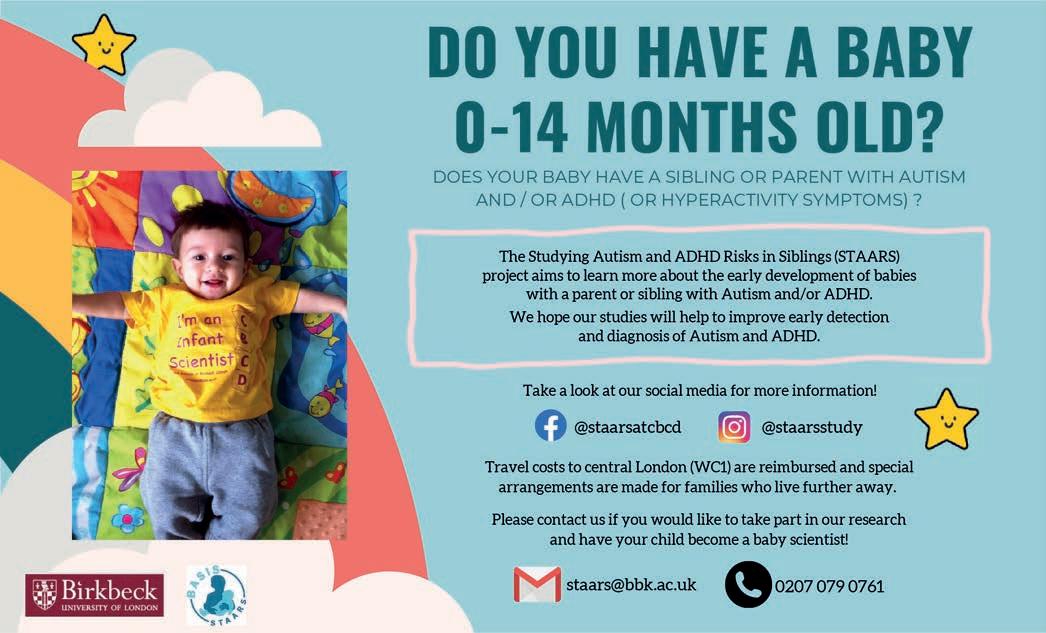
Text messages only: 07955 442251
Autism-Specialist Counselling Centre, 9 Darwin House, Corbygate Business Park, Priors Haw Road, Corby, Northamptonshire, NN17 5JG



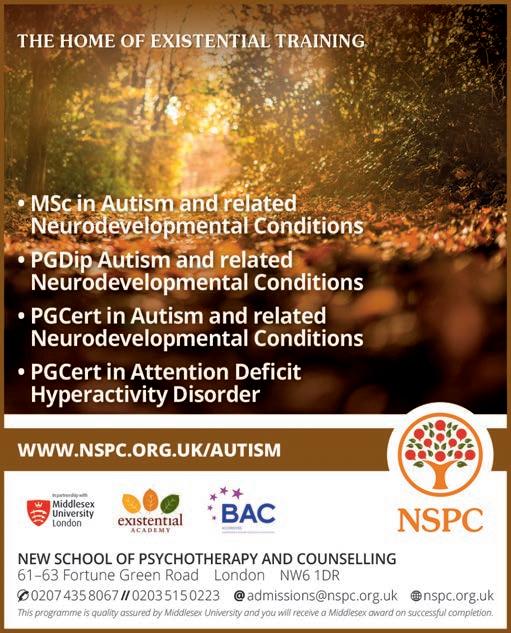
Could you tell us what being autistic is like for you?
To me, being autistic is a gift and a strength. I’m very comfortable with who I am, and I wouldn’t change myself for anything or anyone. I see the world in a different way: for example, I see art, music and colours differently from non-autistic people. There are very bright colours that I like to see as art, but to wear as clothes would be a no – and vice versa. I especially love tattoos; I have three, and am planning to get more in the near future.
How did you start working at the animal reserve?
Before I started working at Port Lympne, I volunteered at the Rare Breeds Centre in Woodchurch, Kent, as a catering assistant. I then started working at Port Lympne as a catering assistant in June 2015. The job was seasonal, but I returned as a permanent catering assistant in March 2016.
In 2018, by chance, my mum saw an advert on Port Lympne’s website saying they were looking for safari drivers. I like driving, so I thought: ‘Why not give it a try?’
Here I am, five years later, and I’m still enjoying the truck driving!
What do you enjoy most about being a safari truck driver?
Driving different people around the park and seeing their reactions when I tell them about the animals. Being thanked by the passengers when the tour is over is also a very enjoyable moment. Sometimes I get given tips,
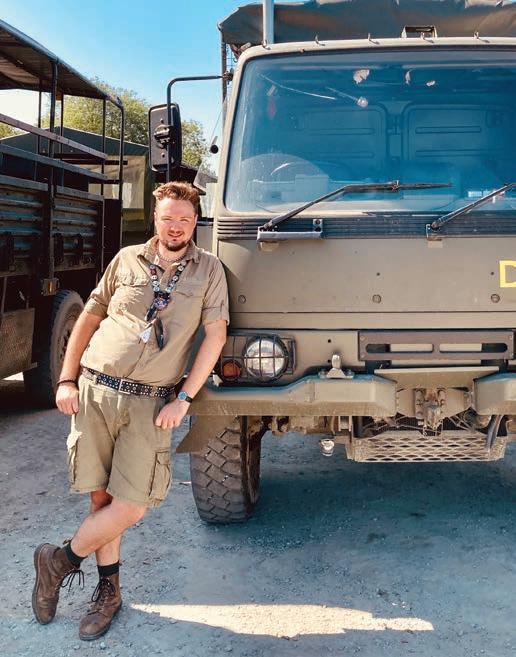
which is a great bonus, but sometimes I unexpectedly get given a handshake – and, to me, that’s even better.
What is your favourite thing about working on an animal reserve?
Seeing all the animals out and about, especially when I’m walking by an enclosure and they come up close to you. The wolf and rhino enclosures are my favourites.

There is something beautiful and majestic about both species.
What’s the most challenging part of your job?
To go around the park three or four times a day and repeat the same script over and over again can be a challenge, but you have to tell yourself to keep calm and carry on.
Some days, I try to change the script each time I go around to make it different. But, at the end of the day, it’s for the guests, and it helps to give them an experience they will remember.
What has been your proudest achievement?
Working as a safari truck driver has taken my social skills to a whole new level. As a catering assistant, I mainly just asked visitors what they wanted when they came in, and said thank you and goodbye when they left. But being a safari truck driver is a big responsibility, especially when it comes to customer service – like always remembering to smile, make eye contact and do your best to help where you can. Over the years, I have grown into a different person, a person I never thought I would become.
What advice would you give to other autistic people looking to start a similar role?
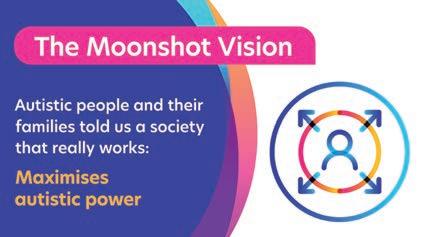
Don’t try to be something you’re not –remember to always be yourself. Make sure the role is something that you like doing – for example, if you enjoy talking to people and are a people person, then working face to face with the public might be for you.
If it’s a similar role to mine, I would say start off slowly and take your time. If you’re finding it difficult, then talk to a manager, and they can try to make adjustments to make the role a bit easier for you. Most importantly, whatever role you want to do, do it with pride, and remember – be yourself!
Sylvia’s son Jamie has been detained in hospital since October 2016, because of ‘complex needs’. Their story was covered on BBC TV in August 2022. Here, Sylvia writes about the lack of suitable facilities in the community, which resulted in Jamie going into hospital, and her fight to get him out
When Jamie was seven years old, I had to give up looking after my disabled mum, to keep up my strength. Jamie and I had lots of fun, but it was exhausting. He went to a respite unit for the weekend once every three months. I asked for more, but there was a waiting list.
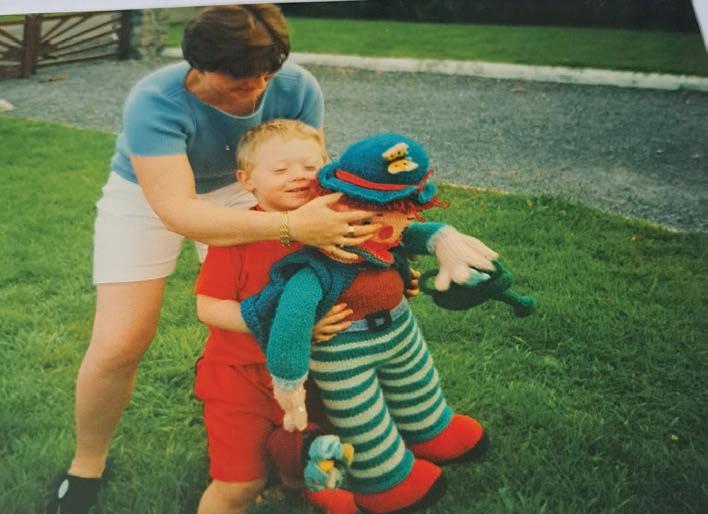
Most of the time, Jamie kept calm and went with the flow. At school, he followed a routine and suppressed his sensory needs and emotions. Then he came home and let go, scratching my face until he saw blood. Being scared of my son was made worse by feeling drained and
not getting the support I asked for.
On the worst day of my life – so I thought at the time – I left my 12-year-old son at school while I was at the social work department from 9am, telling them that I was not able to cope with him any more. I phoned the school in tears when Jamie should have been coming home, to tell them where I was and that I did not know what was going to happen to him. The headteacher reassured me that Jamie was fine and that he had a place to go for that night. They knew where Jamie was going before the end of the
but no one thought to tell me.
After a few temporary places, Jamie was put into a home with young teenagers. None had autism or a learning disability. This haunted me, as Jamie is autistic with limited words. I pictured them laughing at him. I was so wrong. Jamie thrived with them, because the house had so many different personalities and Jamie loves people-watching. He also had pet therapy every week – he loves animals. He was home with his family four days a week, including two sleepovers.
Jamie was in care from the age of 12. When he turned 18, there was nowhere for him to go. I started looking for places myself, and eventually found one. It was registered as an autistic unit. It sounded so good. It had a gym, walking group, pool room, bingo night, and much more. I fought to get him in. He moved in just after his 19th birthday, in May 2016.
One person had worked there for only three years. Another two came from a factory when it closed down. They had no insight into an autistic boy with limited communication skills. Jamie lasted five months
Content warning: this article talks about experiences of violence and being detained in hospital
before he became too complex for them. I asked about taking Jamie to the gym. They said they hadn’t had the training for that. I asked about the walking group. They said Jamie would need his own car as they met some distance away. I went to one of the bingo sessions. Everyone got a card, when one person filled in their card, that was the end of the bingo. It was so boring.
They changed Jamie’s routine. No sleepovers. Family visits reduced to an hour each. They said it was because they had to get to know Jamie. His family could have been part of that process.
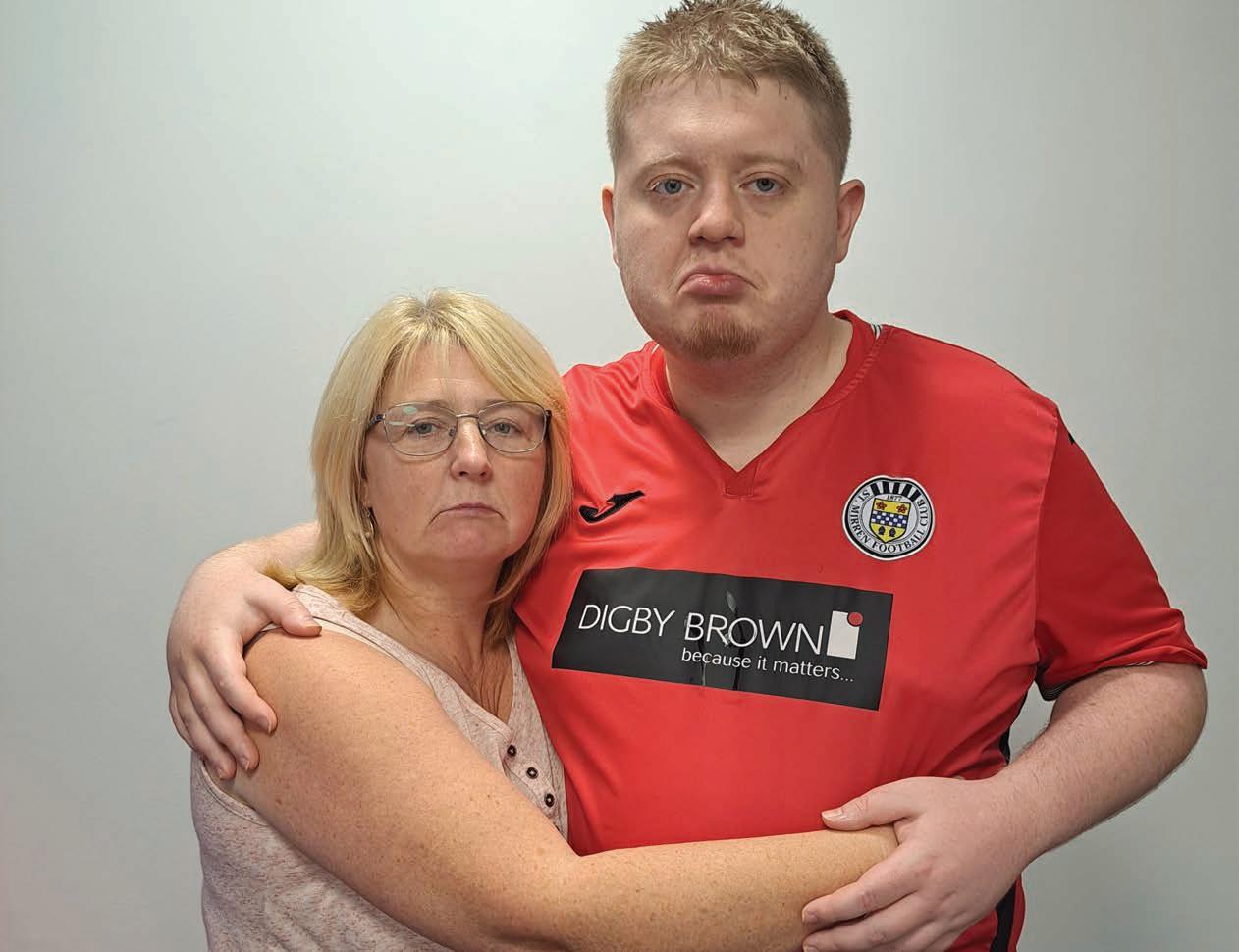
The overwhelming majority (92%) of autistic people and people with a learning disability who are detained in hospital in England are held under mental health laws. We and our campaigners have been calling for changes to the law for years, so it respects autistic people’s rights. In January 2021, the UK Government announced promising proposals for change to mental health law in England and Wales and, in
June 2022, a draft bill to reform the Mental Health Act was published. Similarly, a review has proposed welcome changes to mental health law in Scotland. These changes must be progressed urgently to stop people being detained just because they are autistic, and make it easier for autistic people in hospitals to leave. We’ll keep campaigning across the UK to make this happen.
Staff found it hard to communicate with Jamie. He was not kept busy enough. He was left hanging around the grounds of his house. This resulted in him trashing his house then being ‘sectioned’ – taken into hospital for assessment under the Mental Health Act in October 2016.
Three months later, Jamie was ready to leave hospital – but, again, there was nowhere for him to go. He remained on delayed discharge until March 2020, waiting on social workers to find him a house in the community. The only reason he did not get worse was because he had back his routine of four days a week with his family.
At last, Jamie was getting out. A new hospital was built nearby, and new community housing. Patients who could live in the community remained in the old hospital until their houses were completed.
Then disaster struck: COVID-19. Jamie’s routine was changed. No family visits. No time off the ward. Frustrated, he pulled a socket off the wall, leaving live wires exposed. He was moved into the new hospital until the electrician made it safe for him to return. Jamie never got discharged to his new home and is still in the hospital.
When lockdown was lifted, his routine was not restored. He is allowed two visits a week. Occasionally he is escorted to the
hospital cafe, then for a walk in the grounds – but these arrangements are often cancelled at short notice, causing anxiety, frustration and meltdowns.
Now the hospital is saying that if our local council puts together a bespoke package of support for Jamie, he could live in the community. Our council is saying that Jamie needs a specialist risk assessment before it will provide a bespoke package.
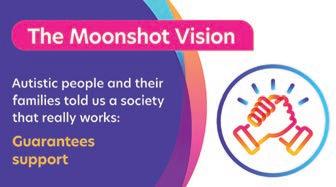
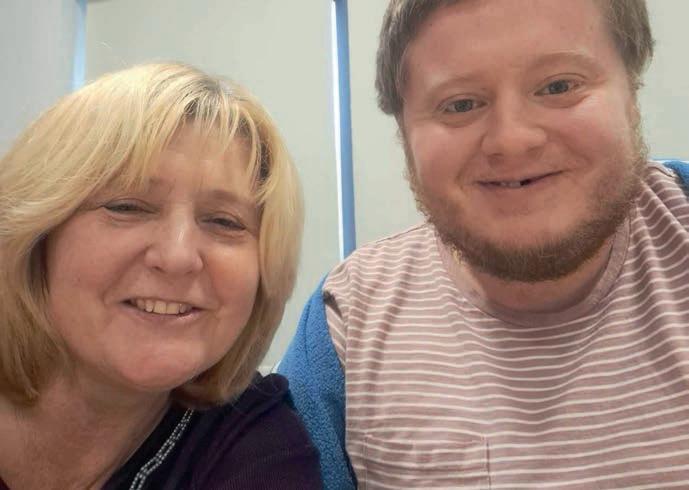
What they have been doing since Jamie was 18, they are still doing now he is 26: passing the buck between health and social care; leaving my son to rot for as long as they can get away with it.
Autistic people do not cope with the environment and demands of psychiatric hospitals. When they have a meltdown, they are restrained and sedated and locked in their rooms for 24 hours. This causes more ‘behaviours’ and more
restrictions, a vicious cycle. Their autism is ignored. The advice of their families, and of outside experts, about what works best is ignored. They might never get out of the hospital, even though they just went in to be assessed.
If your child is ‘trapped’ in a psychiatric hospital, get advice and support from groups such as New Routes Home or Get Me Out of The State Hospital, both on Facebook. Ask a mental health solicitor or the charity Civil Rights First about your legal rights. If nothing else works, take your story to the media.
I will keep fighting for Jamie to be discharged and for the many other autistic children, and those with ADHD and learning disabilities, to have a happy life in adulthood. In their own homes, not hospitals.
“The advice of their families and of outside experts is ignored”
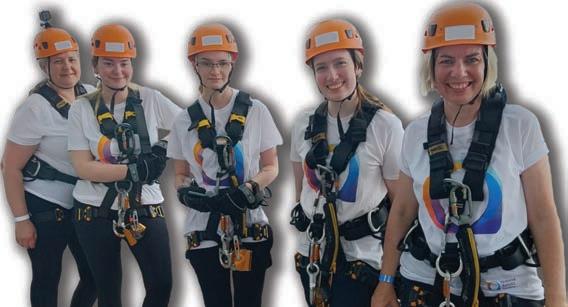
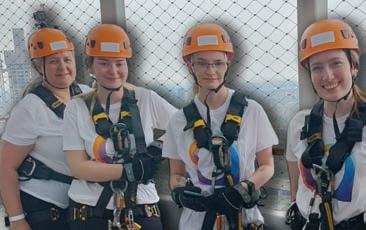

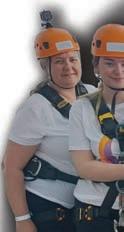


28 October 2023






National Lift Tower, Northampton
We’ve taken our Abseil for Autism event to new heights this year. Join Team Autism this October, as they conquer the challenge inside the largest abseil tower in the world!
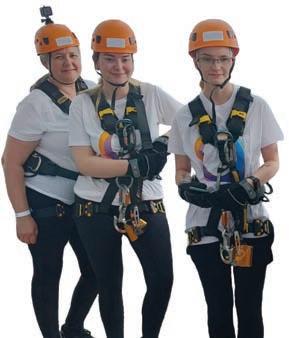
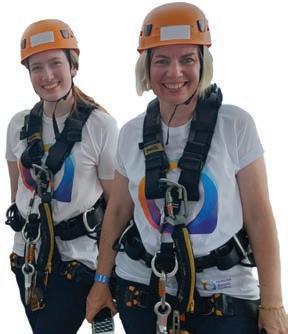
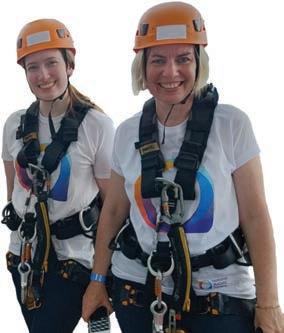
Find out more and book your place: autism.org.uk/abseil


Scanthe QR code for further details

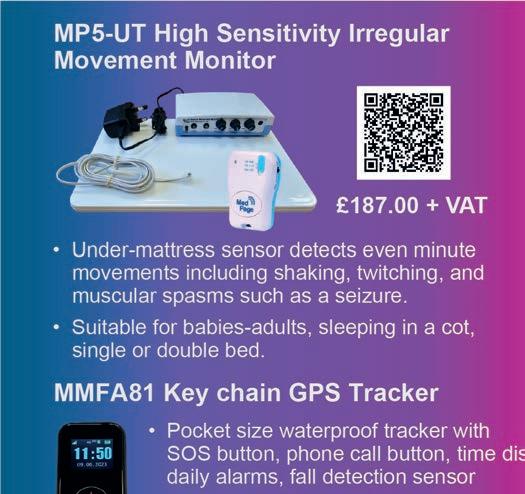





Anna explains why routine is deeply comforting, but how it can also drastically limit your life
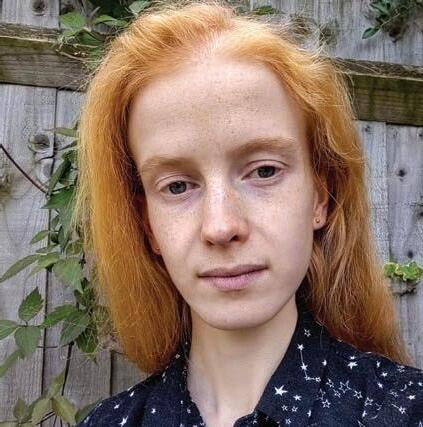
I do two crosswords while eating breakfast – never more, never fewer. I know exactly how long it will take me to complete the first one, and that I should be scraping the bottom of my bowl as I finish the second. Afterwards, I listen to a certain radio show while checking my emails; if the show finishes before I do, I replay the audio.
When the clock chimes 10am, I take a break: a snack and cup of coffee in a particular blue mug while working on a jigsaw, my phone timer set for 30 minutes. The afternoon activities – perhaps shopping, cleaning or running errands – obey a strict repeating rota. Each is pencilled inside a specific time slot and done in a certain manner – I wouldn’t be shocked to see footprints worn into the carpet from hoovering each room in the same way each week. The day’s outfit follows a schedule, too, as does the show I watch in the evening, the route I take on my daily walk, and the flavour of herbal tea I drink at precisely 3pm.
My entire life is full of routines: ‘sequences of actions regularly followed’, as defined by the Oxford Dictionary. Those who struggle to form such rigid habits often envy my ability to stick to these routines. Instead of following a regular, pre-planned schedule, their lives are spontaneous, in a constantly changing state from one week, day, minute, to the next. Others say that I show great self-discipline, doggedly ‘resisting temptation’ by repeating the same actions despite what life throws at me. But, for me, living in any other way is unthinkable.
I’ve seen a love of routine mirrored in other autistic individuals, whether it be always choosing one particular option, carrying out tasks in a fixed order, or repeating the same activities day in, day out. It might be because routine is comforting. It is controlled and determined. Routines mean I know what is happening and what to expect; they leave no room
for uncertainty. The American author Robert Collier famously said “success is the sum of small efforts repeated day in and day out”, and I relate to that immensely – my daily routines leave me with a sense of power, autonomy, like I have done the right thing. No matter what else may happen, I know I have succeeded at something.
Of course, nothing is fundamentally wrong with liking routines. They are useful: my cleaning schedule means that my house never gets dirty, while grocery shopping at the same time each week means that I know how long the process will take, how busy it will be, that I’ll be able to find all the ingredients for my fixed rotation of meals. Society encourages building routines as a way of making positive changes to our lives, from improving our fitness to reducing stress, and there is a whole host of scientific evidence favouring it. Tips include incorporating a new activity into something you already do (try practising a language while you brew
When routines become restrictive
your morning cuppa), or making a chore more enjoyable (listening to your favourite music while doing laundry, for example). Eventually, the new action becomes automatic. You don’t have to think about it; it is now a habit firmly entrenched in your life. But this is where the problem can lie.




You see, routines can be helpful –until you can’t break out of them. Until you are trapped within them, unable to act any differently; until your life shrinks to the binding confines of the routine that slams the door on all passing opportunities before you can give them a chance; until one unavoidable change drags you from the security of your habits, and the whole world caves in around you. The 18th-century writer Samuel Johnson summarises this nicely: “The chains of habit are too weak to be felt until they are too strong to be broken.” Unfortunately, for me and other individuals who have an overwhelming affinity to fixed routines, this is too often the case. Routines become restrictive. That same habit that brings us such comfort and joy becomes the chain holding us back and stopping us from living.
What does this look like? To me, it is automatically saying ‘no’ to things that would require changing my routine. No, I can’t go out for lunch in a different café with my sister. Sure, I could go to my usual café – but this new one won’t serve the right sandwich with the right bread, and besides, she wants to meet an hour too late for my lunch. No, I can’t join my neighbour on a dog walk, even though I adore her dog, because I always listen to a podcast when out walking and I can’t do that if I must
“Routines can be helpful until you can’t break out of them”
chat to someone else. No, I can’t go to see a doctor about a nagging concern, because the surgery is only open at times when I need to be doing other things – and no, I couldn’t possibly do them later!

How about the changes that can’t be avoided? I know I must accept that, sometimes, I need to do things differently – in fact, I often want to try something new. But theoretically accepting a change is one thing;


making it is immeasurably harder. Imagine my life as a rectangular box; all the parts of my routines are Tetris pieces that fit together perfectly within its four walls. Changing a routine is like swapping one piece for another with a completely different shape. The new piece won’t fit in the gap, no matter how hard I try, so I must completely reorganise all the other shapes to accommodate it. In real life, this means spending days or weeks beforehand preparing for the ‘new piece' – working out which change would require the least shuffling about and be the most manageable. Anxiety escalates internally as the event draws nearer, leaving me unable to carry out even my previous beloved habits. I am tense, on edge, exhausted. The stress continues to roar through my system even once
the disruption is over. Bear in mind that this is just for planned changes; spontaneous ones are unbearable. It doesn’t matter if it is something I might enjoy, like a trip out with friends or a card game with my brother, because I don’t know when it will end or what will happen – when will I be able to get back to normal?
Routines can be useful, but also choking. My need for routine stops me trying new experiences or exploring new places. It makes me turn down social activities and avoid things I love. In the moment, each ‘no’ makes me feel comfortable and reassured, yet, in the long run, closes off another pathway, making it harder to move forward from where I am now. My routines bring me comfort and a sense of control, but also leave me lonely, miserable, and trapped in a cage.
“Theoretically accepting a change is one thing; making it is harder”
The Matt and Co Comedy Show is back! Join us at the Clapham Grand in London for an evening of laughter and fundraising.

Hosted by award-winning comedian and our ambassador Matt Richardson, and featuring:
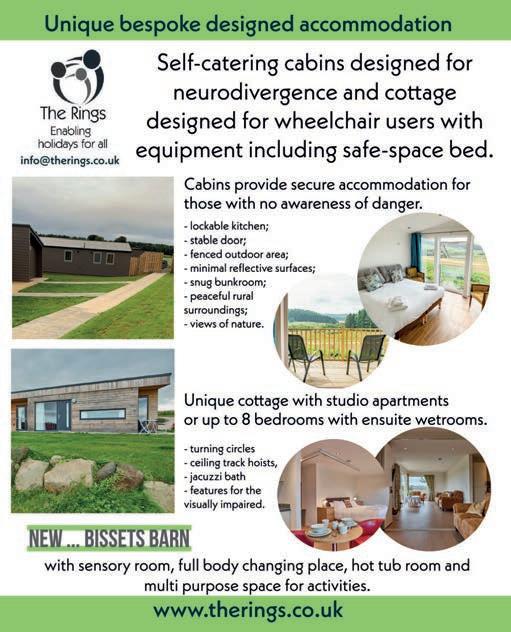







Date: 14 November 2023






Doors open: 6.30pm
Ticket price: £31.42



Age restrictions: over 18s only. Please note the line-up is subject to change.
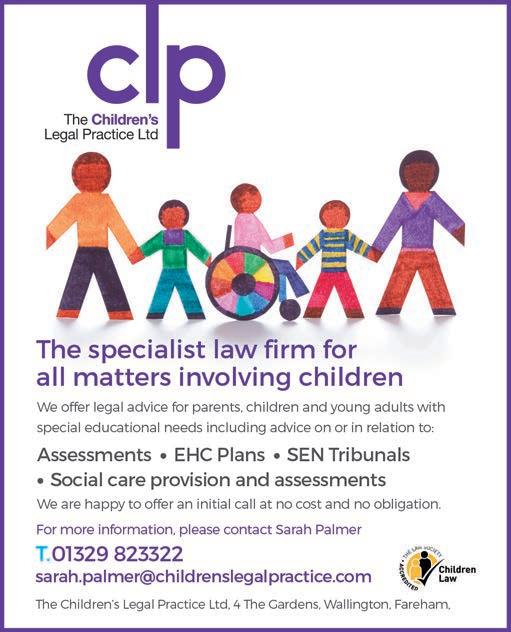
Buy tickets at autism.org.uk/the-matt-and-co-comedy-show-2023



Do you have an issue our readers can help with? Get in touch and benefit from the experience of your fellow members
QI am mum to a wonderful four-year-old autistic child who is almost non-verbal, but very ‘techy’. I would love to teach him to type on a keyboard when he starts reception in September. Can anyone recommend a keyboard to use, or a course/book on how to help him learn to type? Gilda
For extensive information and guidance about autism, visit our website: autism.org.uk
AMy daughter was nine years old and in year 5 when we first realised that touch typing was going to be crucial for her as she moved through school.
We started with BBC Bitesize’s Dance Mat Typing (bbc.in/3OtMVyo). It’s a fun introduction to typing for children, with animated cartoon characters playfully guiding users through the basics of touch typing. My daughter really enjoyed it.
Once she had worked her way through that, we moved on to Typing Club (typingclub.com), which is still aimed at children, but is a lot more comprehensive.
Typing Club is also free, although you can upgrade to a paid-for service with special features. We always just used the free content and it was perfectly fine. In fact, it is because of Typing Club − and my daughter’s
persistence with it − that she is a really good and fast typist today.
My daughter is now 16 and has just completed her GCSEs. Her ability to touch type has made a huge difference to her throughout high school, but especially with exams. It means she can translate her thoughts into words quickly and legibly – something she would struggle to do if she was handwriting.
Touch typing is a skill I would recommend for any child or young person – autistic or not. We wish you and your son every success. Best wishes, Susan

Thank you for your great advice, Susan. You win a copy of Success with sensory supports: The ultimate guide to using sensory diets, movement breaks, and sensory circuits at school, by Kim Griffin.
I live in a rural bungalow and it was quiet and peaceful until a new neighbour moved in two years ago. I have been kept awake with yelling and banging at all hours, and his washing machine on a spin cycle at 4am. I have also been woken by vile verbal abuse. He keeps harassing me and offering unwanted gifts, yet all I want is to be left alone. Because of his disabilities, there seems little can be done, yet it has a great effect on my wellbeing. Can anyone offer advice? Nick
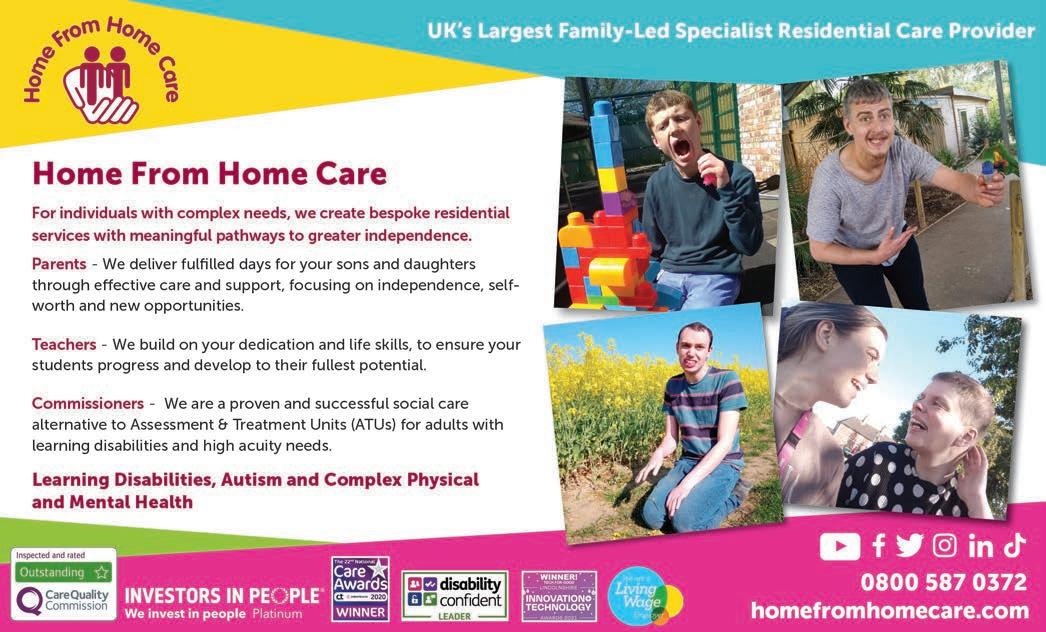
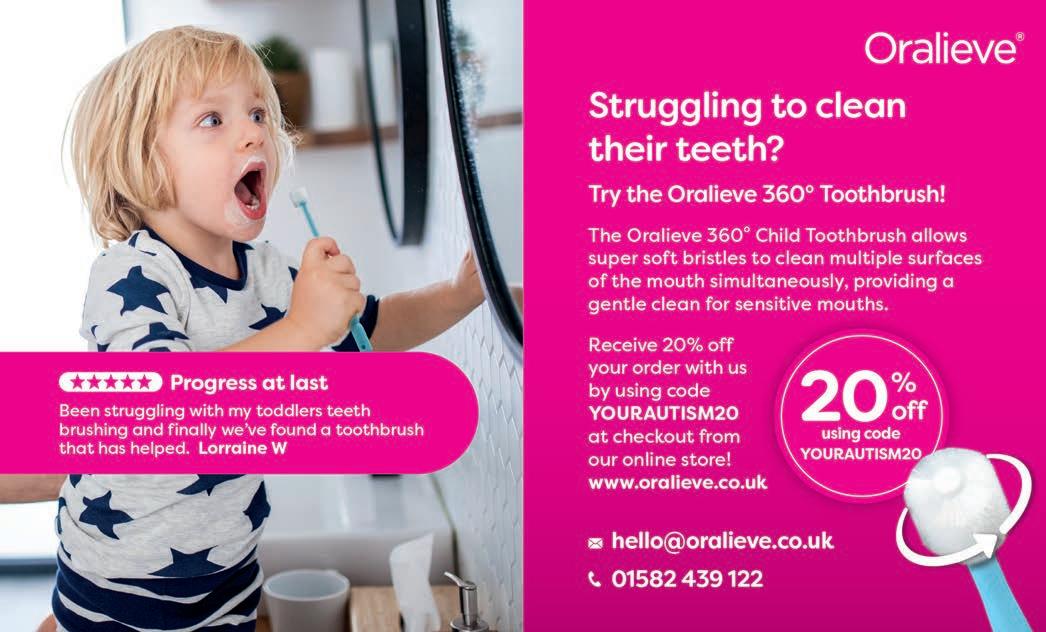
Vanda Latchford, our Candidate Engagement Manager, explains how to make an autism profile to tell your employer more about you
An autism profile is a short document to help you and your colleagues know the best way to work with you. There are many benefits to having an autism profile at work:

● It helps you become more aware of your own autism – your strengths and areas of challenge, and what helps you remain productive and well.
● You can use your profile as a way of disclosing your autism diagnosis.
● You can use it to decide what reasonable adjustments and management strategies you may need in the workplace.
● It helps to reduce the possibility of workplace misunderstandings and miscommunications, because colleagues will understand much more about you and know what to do to make a difference.
● If you are having difficulty explaining your needs to someone who supports you – such as an advocate, employer, friend or family member – you can share your profile with them to help them understand you more. It means you don’t have to keep explaining the same things time and time again, and you can just be your authentic self.
First, choose your profile format – there is an example opposite. Try to keep it to one side of A4 so employers can quickly access the information and discover the best way of working with you. Always make sure you share your strengths with your employer so they realise the benefits of working with you and the value you bring. Reflect on the attributes you think you have that may be attractive to an employer. These might include problemsolving skills, attention to detail, reliability and loyalty, high levels of concentration, technical ability, and honesty and directness.
You might have detailed specialist knowledge of a topic, be a fast learner or be very creative. If you find it hard to identify your own strengths, ask a trusted friend or family member for their observations.
Next, give a description of your challenges at work. You could be guided by the list in the example shown here, and/or you could come up with your own. Again, ask a trusted relative, friend or professional for support if you need it. Then give a list of what helps with your challenges at work. Examples include a quiet
place to work, headphones, frequent breaks, and written communication. Try to provide ways your manager/colleagues can support you. They won’t always understand or know what to do – if you have a meltdown, for example – unless you guide them, so tell them via your profile, and ask them not to judge or speak to you (looking for answers that you won’t, in that moment, be able to give), but instead let you have a quiet, safe place to recover.
Finally, add a date to your profile. Review it every six months or if anything changes at work – such as a new manager or office change.
Because of the General Data Protection Regulations, your manager should be the person who keeps a copy of your profile. Anyone in your team wanting to look at it should do so via your manager.
Having an autism profile at work, or in your volunteering role, should help you be better understood and supported by your manager and team, so you can reduce the need to mask and can just be comfortable, be yourself, and produce your best work performance. This small document can have a massive impact for you in the workplace.
Name: Sarah Morris
I am autistic, which means I have the following strengths and difficulties:
Strengths:
● punctual and reliable
● technical analysis
● applying research, theory and legislation
● remembering policies, procedures, codes of practice, data and information that has been read
● high productivity once a task is understood and in a suitable sensory environment
● creative problem solving.
Challenges:
● becoming exhausted from sustaining the expected social communication
● learning new tasks takes longer
● anxiety – specifically time and performance anxiety
● I can take longer to refocus on a task or switch between tasks if interrupted or distracted
● noise sensitivity, specifically high tones, alarms, emergency vehicles, squeaks, tapping, cracking sounds
● photosensitivity – strip/fluorescent and bright lighting is painful
● tactile sensitivity.
I find the following helpful:
● written communication wherever possible, with clear and direct language
● frequent breaks during long meetings with fastpaced verbal conversations (more than an hour)
● detailed instructions and visual information
● not relying on my non-verbal body language and eye contact to gauge my interest or understanding
Our free ‘Finding employment’ online course for jobseekers includes more information on creating your autism profile and much more. Visit autism.org.uk/ findingemployment
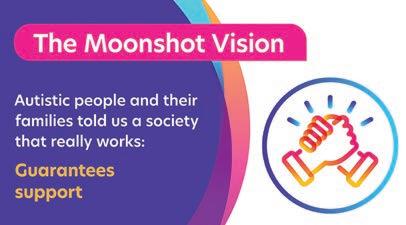
● more time, without interruption, to construct meaningful replies
● a quiet place to ‘reset’ if I become overwhelmed, and more personal space
● headphones are helpful in cutting out background noise so that I can concentrate, as is natural daylight.
Riko shares the ways they manage their demand avoidance, while Steph looks at strategies that help her daughter
● Doing the opposite – If I need to do something – say, have a shower –I will tell myself I don’t need to have a shower. My brain will then think ‘no we are having one’ and then I will be able to take a shower. This won’t work for big demands, such as making a phone call, but it can work for smaller demands.
As an adult, I have developed many strategies to help manage the more difficult elements of my pathological demand avoidance (PDA):

● Role play – I have found chores easier when pretending I’m being filmed for TV. I adopt a character (say, a cleaner) and pretend I’m doing a job for TV. I’ll imagine cameras following me, watching what I’m doing and that people are asking me questions or commenting on my actions. I’ll run an entire conversation in my head, and get the dishes done at the same time.
● ‘You don’t have to’ – By giving myself an ‘out’, it is much easier to meet demands, because I know I can change my mind whenever I want. I’ll tell myself ‘you don’t have to if you don’t want to’.
● Avoidance – One way to meet small demands is to order myself to complete a bigger demand instead. I will tell myself to make a dentist appointment if the dishes need washing, then I will find myself avoiding the phone call by doing the dishes. The phone call demand will become harder to meet though. I’ve been trying to make that phone call for two years, but I’ve done plenty of dishes.
● Not thinking – If I’m able to distract my thoughts from the task, I’m better able to get the job done.
Everyone experiences ‘demand avoidance’ (resistance to doing something that is requested or expected of you) sometimes. However, here we use demand avoidance to mean the persistent and marked resistance to ‘the demands of everyday life’, which may include essential demands, such as eating and sleeping, and expected demands, such as going to school or work. A persistent and marked resistance to demands is a characteristic experienced by some autistic people. It is sometimes labelled as pathological demand avoidance. Read more at autism.org.uk/ demand-avoidance
This works best for getting out of bed. It used to take me hours to get up. I would get more and more worked up, because I needed to get up, but the pressure made it harder and harder; my body would freeze so I couldn’t move at all. By not thinking
of getting up at all, I found my body would move of its own accord. It’s like when you’re walking somewhere but are distracted. By the time you stop thinking, you realise you’ve got to where you wanted to go without even realising it.
● My choice – It’s difficult to take demands from other people. Making it my choice to do what others ask of me makes it a lot easier to do what they ask. So when my partner asks me to get something for him, I’ll think, ‘I’m only doing this because I want to, not because you’ve asked me to’.
● Having some control – Another way to cope with other people’s demands is to think ‘fine, but I’m not going to be happy about it’ or ‘I’m not doing it your way though,
I’ll do it how I want to do it’. This gives some control over how I do a demand, as opposed to whether I do the demand.
● Excuses – People would be surprised at the range of excuses I can give for avoiding or putting off a demand. This is very useful for when demands are sprung on me and I don’t have the ability to meet them straight away. By delaying them, I can wait until I’m better equipped to do the demand, rather than struggling.
● Taking it easy – I try not to meet too many demands in one day. In general, I will start each day with just one demand in mind. Some days the demand will be simple (taking a shower), because I know
I don’t have the energy to deal with a big one and other days I’ll have a bigger demand because I feel better (cleaning a room). I also take breaks in between each demand and find easy, fun things to do scattered throughout the day. If I manage nothing, then I accept that and take it easy on myself.
● Mixing it up a little – When I feel myself avoiding daily activities, I will do something to change the activity, even a little. I may buy new bath products or try new foods. Even moving the demand to a different time of day can help – for example, showering before bed. For me, change is good.
Read more strategies from Riko at dragonriko.wordpress.com
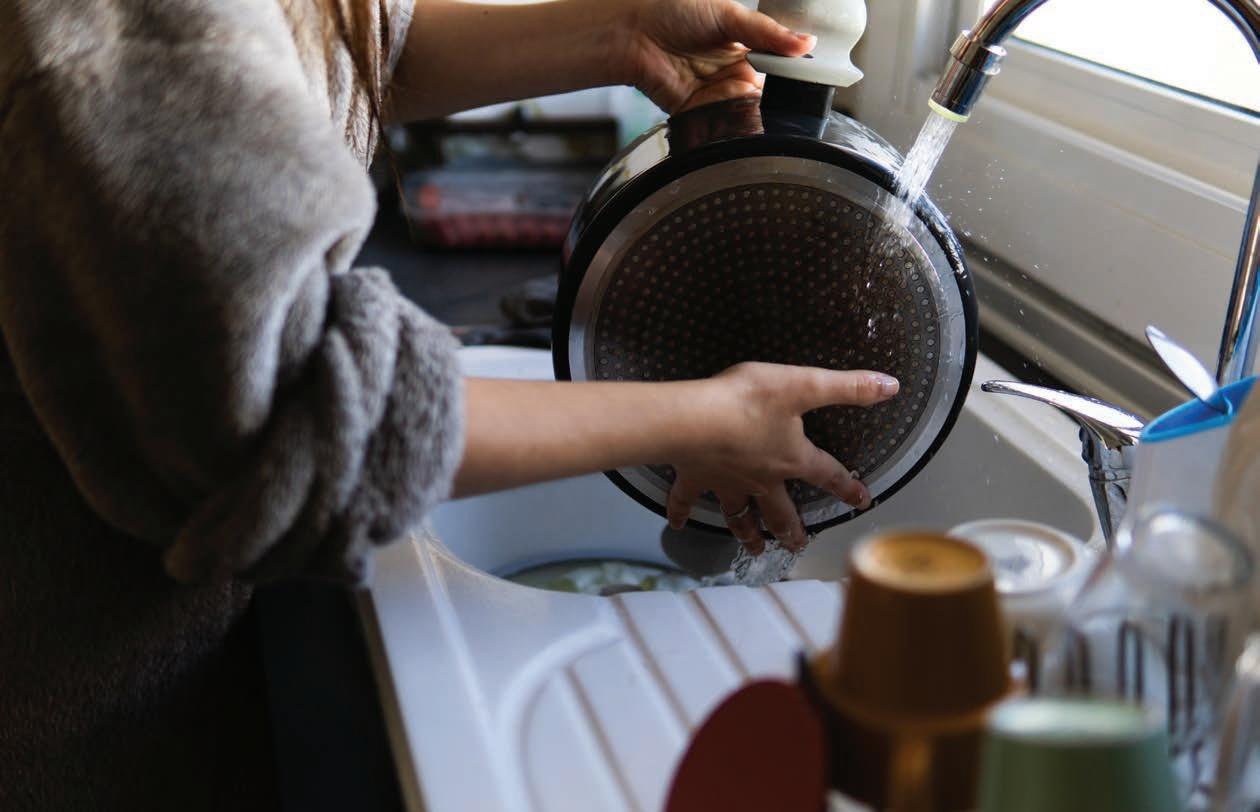


Steph
● Understand the condition – There is plenty of great advice on the PDA Society website, pdasociety.org.uk Cast aside any notion that typical, or stricter, parenting will work. With PDA, the avoidance of, and refusal to comply with, everyday demands is driven by high anxiety. It is not caused by an inherent desire to be oppositional and gain attention.
● Be flexible – One of the biggest challenges with PDA is pulling different ideas and solutions out of the bag daily. A phrase often used is that being around PDAers is like ‘walking on eggshells’. A great deal of care is being taken constantly to avoid complete refusal. To onlookers, this may seem haphazard and random, but a lot of thought and intuition goes into how to approach tricky situations. There is no point having fixed ideas of how you want to achieve something; flexibility is key to success.
● Build relationships – For most autistic children, good relationships are crucial for progress. Trust can be built up when the child realises that the difficulties they are facing are appreciated and understood. It is
vital to watch every little reaction of the child, to unpick where the anxiety stems from and to understand what the issues are on an ongoing basis.

● Offer choices – Not too many choices, because, otherwise, the pressure of picking one of those options may be too much. A choice of where to go, or what time to do an activity, for example, will be much better received than an instruction involving ‘now’.
● Choose words carefully – In other words, never say ‘no’. Even when our girl was still quite young and not speaking in full sentences, I would joke with people that her favourite word was ‘no’ – but only as long as she was the one using it. If we dared to use it, it would pretty much guarantee an outburst of extreme anxiety; it meant a loss of control for her, and nothing else would be achieved that day.
Of course there are times when it might be necessary to use the word ‘no’. If a child is about to run in front of a car, an urgent ‘stop’ or ‘no’ should be used, but it helps to save this kind of language for when the
situation is most drastic. The child is then far more likely to listen and trust that it is important.
Direct demands should be removed from language wherever possible: no ‘need, must, have to’ and instead much more of ‘may, could, would you like, how about’. More of “I wonder if we might be able to…” or “I'm not sure how to do this, do you think you can show me?”
Actions can also be phrased as a challenge or fun game rather than a direct demand. So, instead of “time to brush your teeth”, we might say “I bet you can’t finish brushing your teeth before I’ve finished mine”.
● Pick your battles – Weigh up what matters more to you: clean teeth or leaving the house calmly? If you drop the teeth brushing, are you more likely to be able to leave the house on time in the morning because the rest of the routine runs smoothly?
Visit stephstwogirls.co.uk for more tips and advice. Steph’s book PDA in the family: Life after the lightbulb moment will be published by Jessica Kingsley Publishers in January 2024.

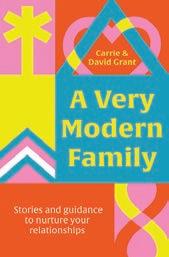
AUTHOR: Carrie and David Grant
PUBLISHER: Piatkus
PRICE: £14.30
VERDICT: Painstakingly honest parenting advice
Described as how to navigate parenthood in a genderfluid and neurodivergent age, this is an invaluable guide to parenting autistic children. Carrie and David Grant recount some very difficult parenting experiences, such as when two of their children were suicidal. Carrie describes experiencing child-to-parent violence and being at a loss to know how to cope with it.
The stories they tell are very moving and will resonate with other parents. For instance, Carrie talks about
when two of her children were diagnosed as autistic: “What we didn’t see was the fight we would have to endure for our children to be understood, for them to be heard and for their needs to be met.” And “We also knew nothing of the absolute joy that would be felt when one of our children achieved even the smallest win.”
The book discusses ethnicity, gender and autism, and there are recommendations, such as using the non-violent resistance strategy, and how to build resilience, manage conflict and keep hope.
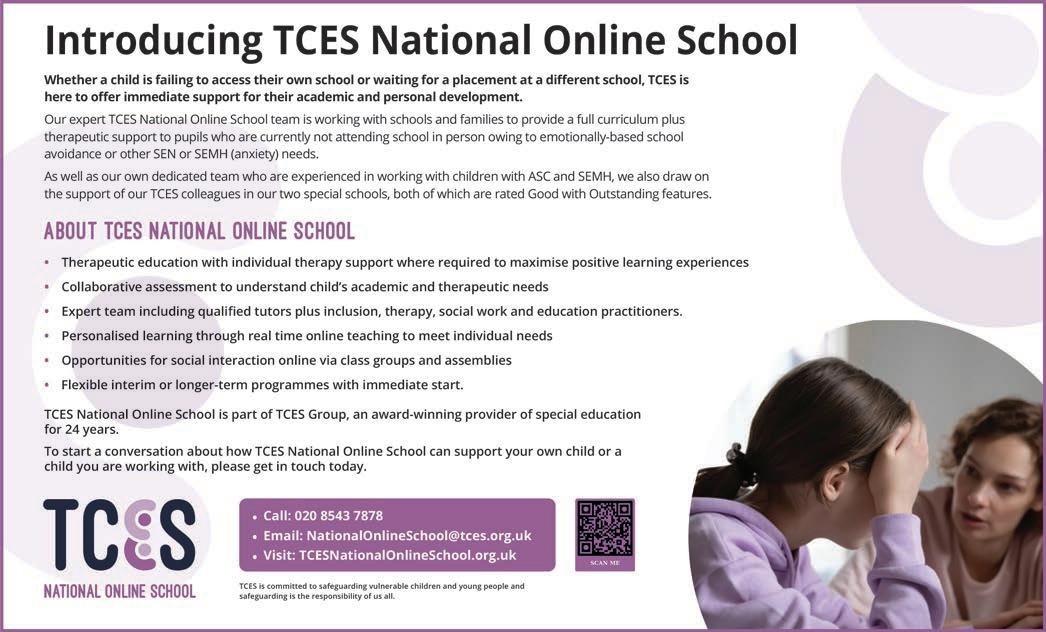
My favourite line is: “When we look at our children, we do not only see autistic or mixed race, non-binary, trans or gay: we simply see Olive, Tylan, Arlo and Nathan.” The key message is treat everyone as an individual and adapt your parenting style to match their needs.
Suzanne Westbury, Editor of Your Autism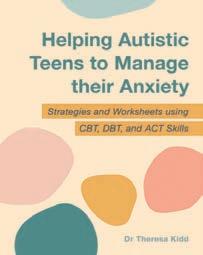
AUTHOR: Dr Theresa Kidd
PUBLISHER: Jessica Kingsley Publishers
PRICE: £19.99
VERDICT: Excitingly, this book delivers exactly what it promises
Dr Kidd explains why autistic teens are more likely to experience anxiety – and how this is expressed, helping me gain a stronger sense of what was happening for my son.
I hope that professionals will read her piece about making anxiety treatment more accessible and engaging. There is also a fantastic chapter about supporting your young person, which is enriched by worksheets for parents at the back of the book.
I wish that we had had these ideas, and reassurance, years ago. I could immediately relate to and benefit from these.
Cognitive Behavioural Therapy, Dialectical Behavioural Therapy, and Acceptance and Commitment Therapy are explained clearly, with information as to how Dr Kidd believes each therapy – correctly applied – can support our teens. There follow a series of worksheets for each theory, which you or a professional could use with your young person. Some, I felt, were too complex for me to use confidently, but most are very accessible and, being illustrated in an anime style, will be appealing to most teens.
This book made me feel empowered, and that I can support my son with some really useful tools. I’ll also be recommending it to the professionals who work with him.
Karen Wright, Your Autism magazine reader bridportchildrenswriter.com @karenwrightwriter
AUTHOR: Holly Smale
PUBLISHER: Century
PRICE: £14.99
VERDICT: Wonderful book, with an authentic autistic lead character
Holly Smale’s debut adult novel is an intriguing tale of love, loss and learning about yourself, woven around Groundhog Day-type time travel.
Cassie is able to relive days, hours, even minutes over and over as she attempts to “get things right”, but often finds herself encountering the uncalculated consequences of changes that she has made along the way. I especially liked how Cassie grew to recognise the importance of those around her.
I wasn’t sure about the ending at first, but after a re-read I’ve come to the conclusion that it was the right ending for the story. Holly Smale has delivered a truly wonderful book with a beautifully authentic autistic lead character, and a genuinely heartwarming message about accepting yourself and your past.
Helen Ellis, Project Officer – Autistic Employee Experience at the National Autistic SocietyWe have a copy of Holly Smale’s new book, The Cassandra complex, to give away to a member. A Reese Witherspoon Book Club pick, this is Holly’s debut adult novel and it has an autistic protagonist. For your chance to win, please email your name and postal address to YourAutismMag@nas.org.uk by 27 October 2023, quoting ‘Cassandra’ in the subject line. The winner will be announced in the next issue.
The winners of last edition’s giveaway for a copy of Untypical by Pete Wharmby are Jack Shaw and Jennifer Cook. Congratulations!





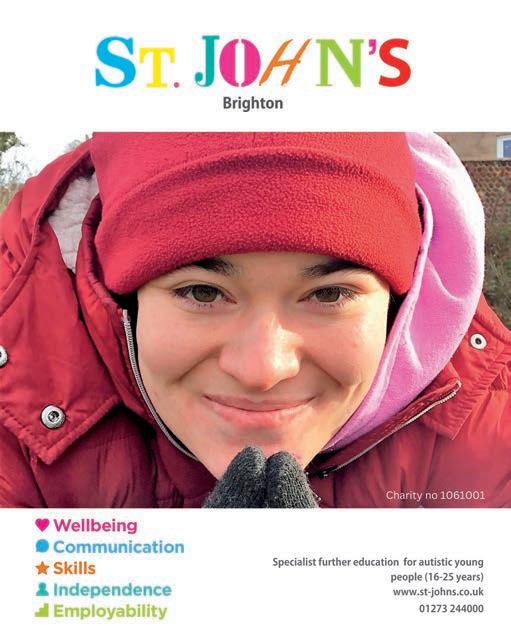

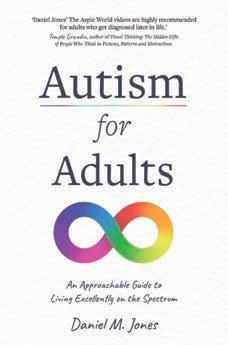 AUTHOR: Daniel Jones
AUTHOR: Daniel Jones
PUBLISHER: Hay House
PRICE: £12.99
VERDICT: Refreshing, relatable life guide
In his first book, autistic influencer and founder of The Aspie World Daniel Jones shares all the things he’s learned and used to hack life and create
a happier life as an autistic person. He covers ways to navigate common challenges, such as making friends, dating, holding down a job, and performing well at school/college. His advice is realistic, and he describes how each hack came about and how it helped him. Each chapter ends with a list of easily digested actionable points.
It’s a very enjoyable read and I really like his succinct summaries of difficult situations. Highly recommended.
Suzanne Westbury, Editor of Your AutismReally helpful cards that can be used to quickly explain without having to verbally communicate or repeat yourself. stickman communications.co.uk (recommended by our Young Ambassadors)
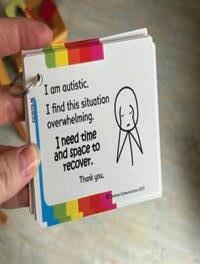
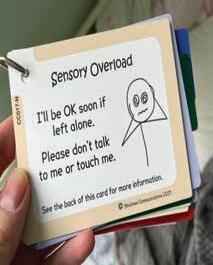
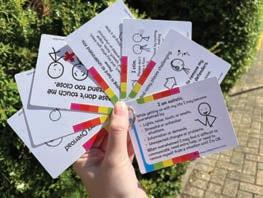
A great fidget tool to keep hands busy. Builds hand and finger strength to help with handwriting too. Available at amazon. co.uk and many others.
If you struggle with loud noises, a pair of noise-

cancelling headphones can help when studying, walking around or during loud classes.
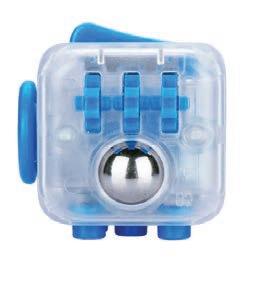
Glide, flip, roll and click with switches, gears and more, for soothing fidget fun. Small, quiet and unobtrusive for school. £3.99 from smythstoys.com
Keep a selection at school – it’s good to take a colouring break when things feel overwhelming.
6Wobble cushion
This stability cushion can help you feel more grounded, calm and focused. £18.49 from sensorydirect.com
Do you have an idea for our six favourites section? Email us at: YourAutismMag@nas.org.uk
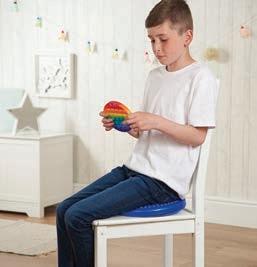
Meet Juno, whose A level photography work shows how they see the world. Juno tells us about their art, writing a children’s book, and their teacher, Sarah
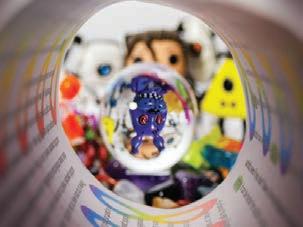
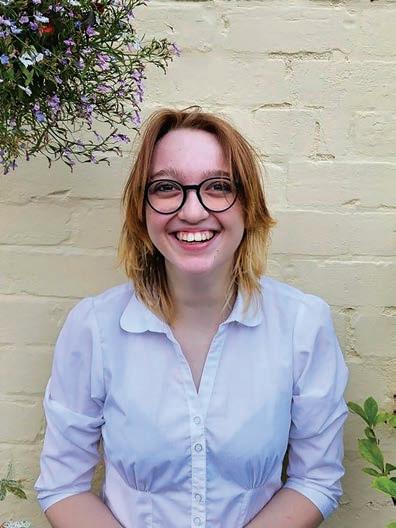
Picture A: In my photography, I wanted to show how my special interests are a big part of my autism. Lots of people don’t understand the beauty of special interests and I wanted to show the view through the eyes of an autistic person. Autism is frequently perceived as being unpleasant and difficult to deal with, yet there is also joy to be found.
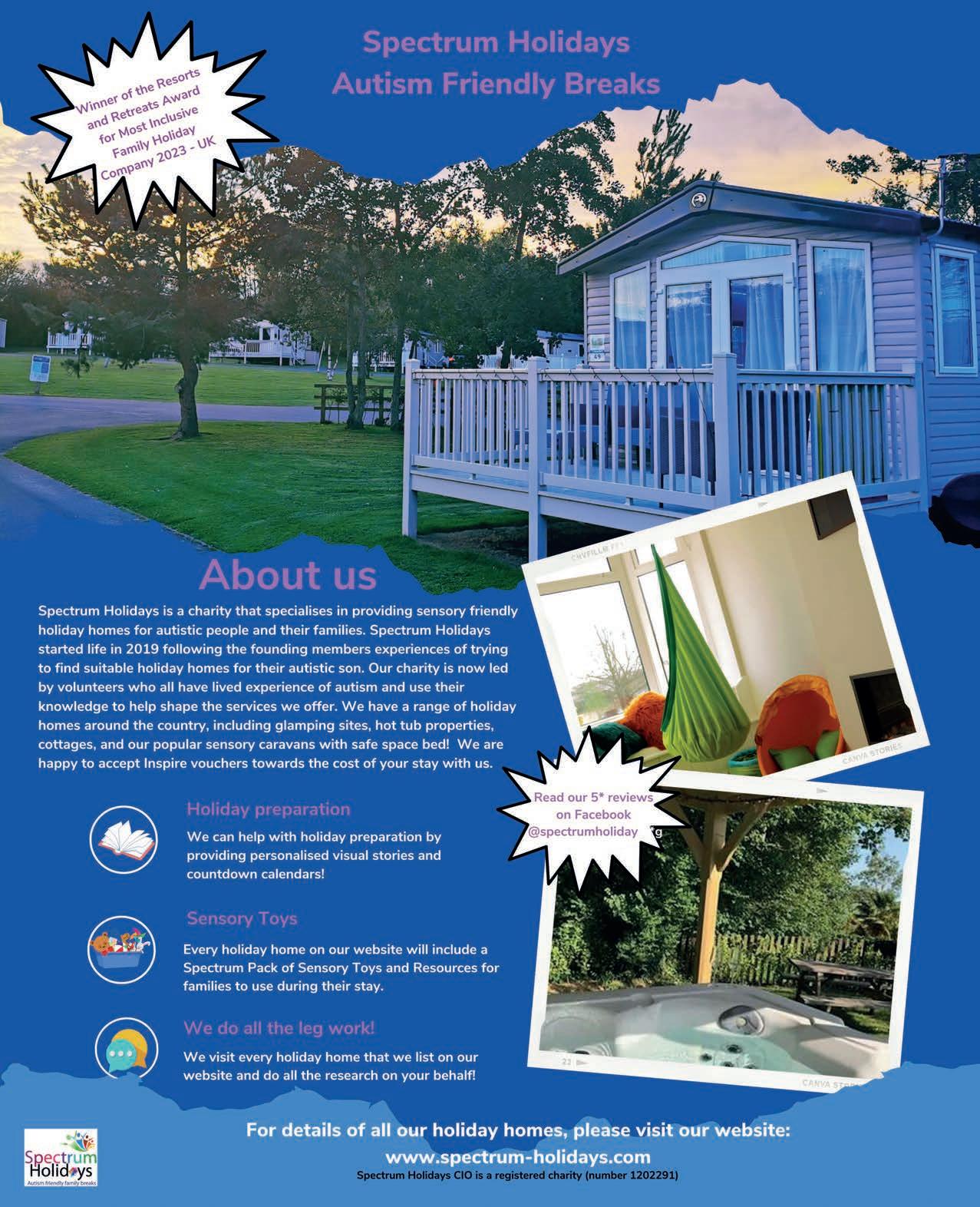
Picture B: I took this photograph to reflect that I want society’s views on neurodivergent people to change. The characters inside the glass spheres represent autistic people; you can see how they have their own world. The matte figures are depicted to be more curious and understanding of their existence, as opposed to judgemental – which is how it should be.
For my art and design foundation course, I made a magpie out of recycled materials. This led to me writing a children’s storybook, Two for joy. My idea began with the relationship between humans and their creations, and how people build things because they feel they are missing something. For example, robot companions.
The book is about a lonely magpie who does not understand how to make friends; she is afraid they will not like her because she is ‘different’. She decides to build herself a friend instead, and this catches the attention of the other magpies. Then she realises that talking about her interests is what sparks friendships. I want autistic

young people to know it is OK to talk about their special interests.
My teacher, Sarah Wesson, understood when I was struggling and would work with me to find a way around whatever problem I was facing, and remind me of my strengths. She’s incredibly supportive.
I plan to create more storybooks. I need neurotypical people to see us for who we are and not what society has pinned us as. I also want neurodivergent people to know I see them, and that they are not alone.
